Keynote Speakers
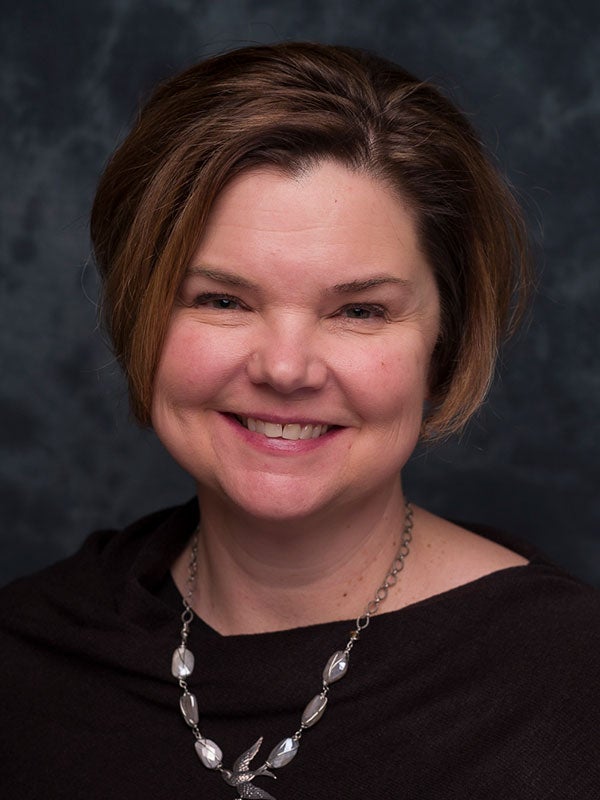
Dr. Rebecca Campbell (she/her/hers) is a Professor of Psychology at Michigan State University. In her research career, Dr. Campbell studies sexual assault survivors’ disclosure and help-seeking experiences.
Most recently, she was the lead researcher for the National Institute of Justice-funded Detroit Sexual Assault Kit Action Research Project, which was designated as an Exemplary Project by the Association of Public & Land Grant Universities (APLU) and the W.K. Kellogg Foundation.
Dr. Campbell is also a Presidential Advisor on Relationship Violence & Sexual Misconduct. She has chaired MSU’s RVSM Expert Advisory Workgroup since its formation in 2018. In that role, Dr. Campbell co-created MSU’s five-year RVSM strategic plan. Dr. Campbell works with MSU students, faculty, staff, and alumni to transform MSU’s culture and climate regarding relationship violence and sexual misconduct.
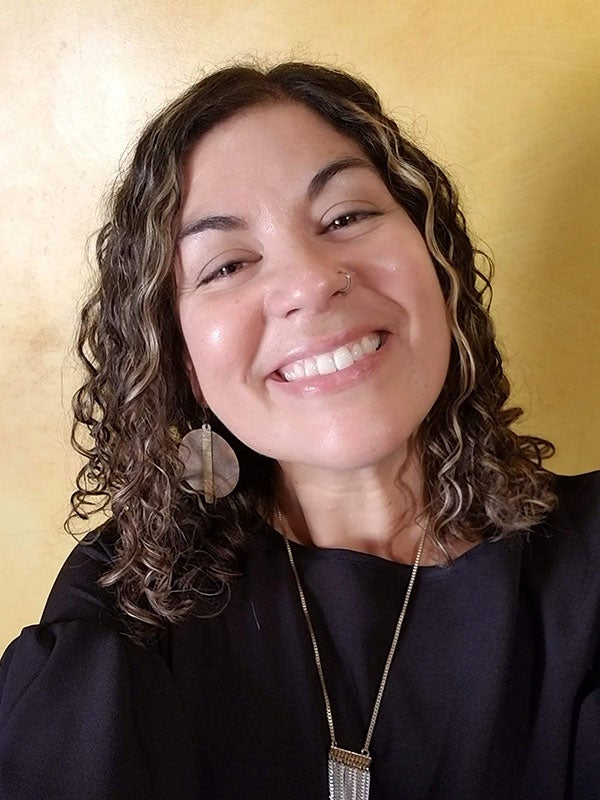
Dr. Xhercis (Sir-Sis) Méndez, (she/hers/ella) is Vice-Chair and associate professor of Women and Gender Studies and Queer Studies Cal State University Fullerton. She is also one of the 2022-23 research fellows in the Women’s Studies in Religion Program (WSRP) at Harvard University where she is completing her manuscript titled Towards Nonbinary Futurities. Prior to Fullerton, she was an assistant professor of Philosophy and African American and African Studies at Michigan State University where she founded The Campus Transformative Justice (TJ) Project, in 2017 in the aftermath of the Larry Nassar Case. The TJ Project offers consultation and facilitation services to higher ed institutions seeking an intersectional and transformative justice approach to building healthy and harm-free educational environments. As a consultant she works with faculty, staff, students, administrators, leadership teams, and academic units to identify the root causes of harm, such as microaggressions, racism, relationship violence, and campus sexual assault, to create actionable pathways towards accountability and healing. She is the author of several articles such as “Notes Toward a Decolonial Feminist Methodology: Revisiting the Race/Gender Matrix”, “Not Your Papa’s Wynter: Women of Color Contributions to Toward Decolonial Futures,” and “Beyond Nassar: A Transformative Justice and Decolonial Feminist Approach to Campus Sexual Assault”. In addition to the academy, she works with various community organizations and serves as a consultant, facilitator, and strategist to organizations seeking to address systemic harm, racism, and antiblackness. Born in Paterson, New Jersey and raised in Cleveland, she the child of Puerto Rican factory workers, and a first-generation graduate who lives to inspire the next generation of believers that “a better world is possible.
Speakers and Panelists
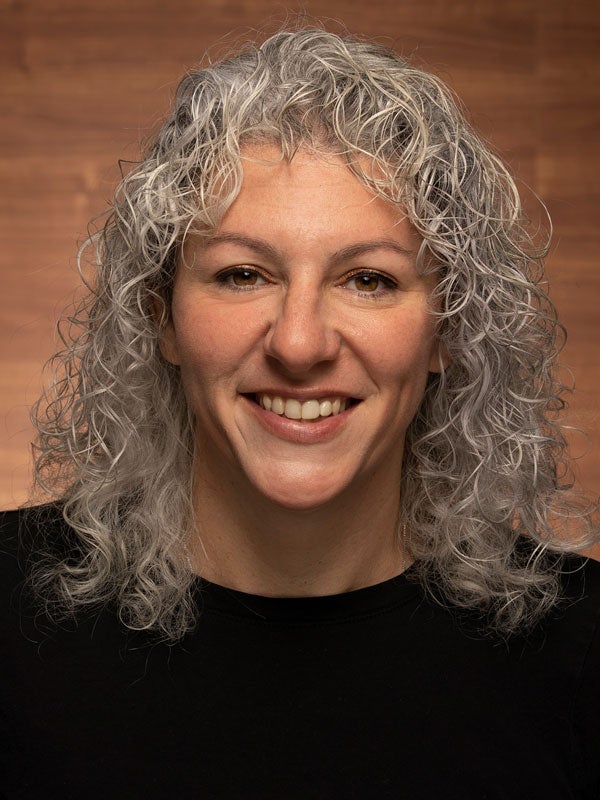
Professor and Restorative Justice Practitioner, California State University, Fullerton
Dr. Alissa R. Ackerman (she/her/hers) is a “pracademic” and “survivor scholar”. She incorporates her academic training, practitioner, and personal experiences related to sexual violence to inform her everyday work. She is currently an Associate Professor and Department Coordinator in the Department of Criminal Justice at California State University, Fullerton. She holds a PhD in Criminal Justice from the City University of New York, Graduate Center and an MA in Criminal Justice from John Jay College of Criminal Justice. Alissa has dedicated her career to understanding everything she can about sexual offending, including why it happens and how to prevent it, the impacts of sexual victimization, and restorative justice options for those impacted by sexual harm. After participating in restorative justice processes as part of her own healing work as a survivor of sexual violence, she began building and facilitating processes for others who sought restorative options as part of their healing. She writes extensively on topics related to sexual violence and victimization in academic journals, books, and OpEds. Dr. Ackerman is an internationally sought after speaker and trainer, having given over over fifty national and international talks on her work, including a TEDx Talk on the importance of connection after sexual violence. Her most recent co-edited volume, Survivor Criminology: A Radical Act of Hope, was released in 2022. She lives outside of Los Angeles, California.

Interim Director of the Institute for Research on Women and Gender / Associate Professor of Women’s and Gender Studies, University of Michigan
Allison Alexy (she/her/hers) is a cultural anthropologist focusing on contemporary Japan, with interest in ideals and experiences of family lives, constructions of intimacy, and legal anthropology. Through the lens of family life, her ethnographic research investigates changing norms around the social and legal constructions of gender contextualized within the rapid societal changes of recent decades. She is the author of Intimate Disconnections: Divorce and the Romance of Independence in Contemporary Japan, which is available through open access. More information is available at: allisonalexy.com
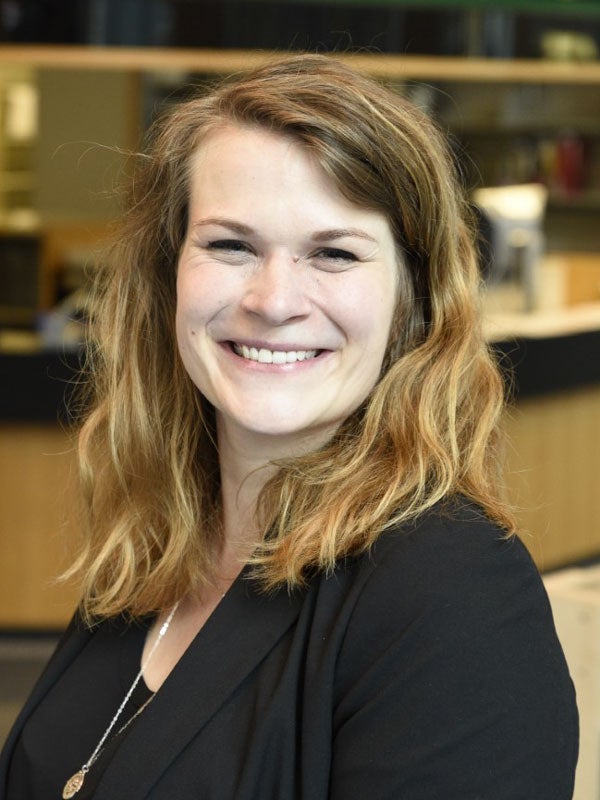
Assistant Professor / Dr. William & Mary
Alicia Andrzejewski (she/her/hers) is an Assistant Professor in William & Mary’s English department, a scholar of early modern literature and culture; queer, feminist, and critical race theory; and the medical humanities. Her work has appeared in Shakespeare Studies, Shakespeare Bulletin, The Chronicle, Literary Hub, American Theater, The Boston Globe, Catapult, Outside Magazine, Electric Literature, The Huffington Post, LA Review of Books, and other publications. Her current book project, Queer Pregnancy in Shakespeare’s Plays, argues for the transgressive force of pregnancy in his oeuvre and the expansive ways in which early modern people thought about the pregnant body.

Sherry B. Ortner Collegiate Professor of Sociology, University of Michigan
Elizabeth A. Armstrong (she/her/hers) is Sherry B. Ortner Collegiate Professor of Sociology at the University of Michigan. Armstrong is on the program committee for this event and was a lead planner of the 2018 Michigan Meeting on Ending Gender-Based Violence. She is a member of U-M’s CCRT. With Sandra Levitsky and other colleagues at the University of Michigan, she researches university responses to sexual violence in a rapidly changing legal, political, and cultural environment. This project is a large, multi-year, multi-method project involving the construction and analysis of a quantitative data set and qualitative field work. They have published on university adjudication procedures, communication about mandatory reporting policies, and have papers under way on definitions of sexual assault, prevention, consent definitions, and litigation against universities initiated by respondents.
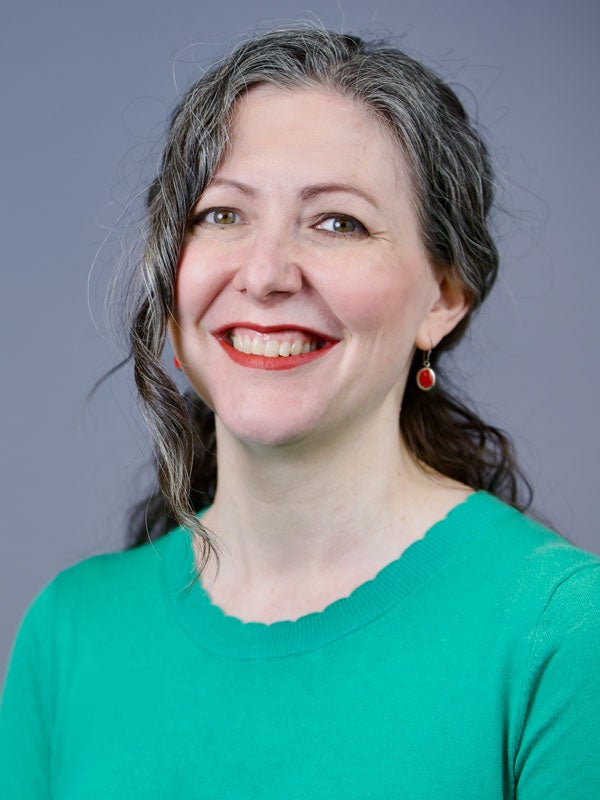
Director, CRLT Theatre Program, University of Michigan
Sara Armstrong (she/her/hers) is the Director of the CRLT Theatre Program. A theatre artist with over twenty years of experience as a performer, playwright, director, arts administrator, and educator, Sara establishes strategic priorities for the theatre program that align with the needs of a range of higher education communities and the Players’ commitments to advancing equity in academic spaces. In her role, she also writes scripts, directs new pieces, and designs and facilitates sessions. In addition to her work with the theatre program, she is also a member of the Senior Leadership Team at CRLT. Sara earned a B.A. in Theatre from Oklahoma State University, an M.A. in Theatre Studies from the University of Kansas, and a Ph.D. from the Interdisciplinary Theatre and Drama program at Northwestern University in 2013. She was also a postgraduate fellow in Dramaturgy/Playwriting at the University of Birmingham, England. Her dissertation focused on the role operating theories of embodiment play in privileging and marginalizing particular student bodies in performance learning spaces.
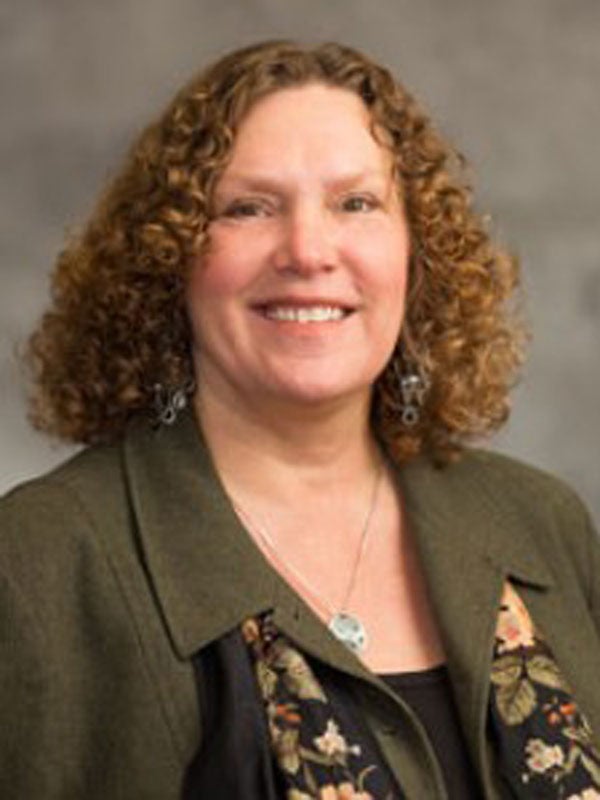
Professor, University of Michigan
Denise Saint Arnault, Ph.D., RN, FAAN, (sher/her/hers) is a Professor of Nursing at the University of Michigan, Ann Arbor, USA. Her research examines cultural factors that interact to influence illness, help seeking, and recovery, focusing on mental health and trauma recovery for people who identify as women. Her methods include grounded theory, Feminist Ethnography, and Mixed Methods. She developed, refined and adapted her theory of the Cultural Determinants of Help Seeking toward a new theory of Cultural Determinants of Trauma Recovery. She also developed and currently conducts research using her innovative Clinical Ethnographic Narrative Interview (CENI) method. She is the founder and director of the Multicultural Study of Trauma Recovery (MiStory). MiStory is an international research collaboration that aims to understand Gender-Based Violence (GBV) trauma recovery from a cultural perspective. Each country conducts surveys and trauma-informed narrative interviews with GBV survivors, talking to survivors of domestic violence, rape, and childhood physical and sexual abuse. The MiStory project has already interviewed over 200 survivors in 10 countries. We are comparing both narrative data and survey data to develop instruments to measure concepts such as trauma recovery pathways, trauma healing, normalization of violence and shame as internal barriers to recovery, barriers and facilitators to trauma recovery, broad recovery self care actions, and sense of coherence as a facilitator to healing.
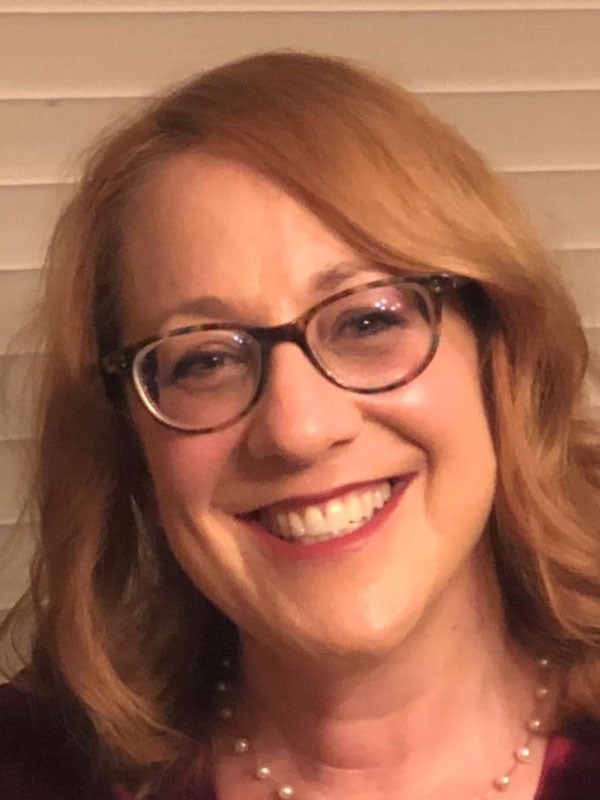
Professor of Sociology, University of Michigan
Pamela Aronson (she/her/hers) is Professor of Sociology and an Affiliate of Women’s and Gender Studies at the University of Michigan-Dearborn. She has over three dozen publications on gender inequalities, sexual misconduct, understandings of consent in the #MeToo era, attitudes toward feminism, gender and politics, the transition to adulthood (including during the pandemic), at-risk students in higher education, and identities and the life course. Her book, Gender Revolution: How Electoral Politics and #MeToo are Reshaping Everyday Life, will be published this summer by Routledge. With a research team, she has been examining sexual harassment in the higher education workplace. She has published in such places Social Forces, Gender & Society, Journal of Cultural Analysis and Social Change, Journal of Youth Studies, Emerging Adulthood, International Journal of Psychology and Contexts Magazine. Her work has recently been featured in Salon, Vox, NPR’s The Takeaway, and BBC Reel. She has received numerous awards, including the University of Michigan-Ann Arbor’s CEW+’s “Inspire Award” and the Distinguished Research Team Award from the University of Michigan-Dearborn.
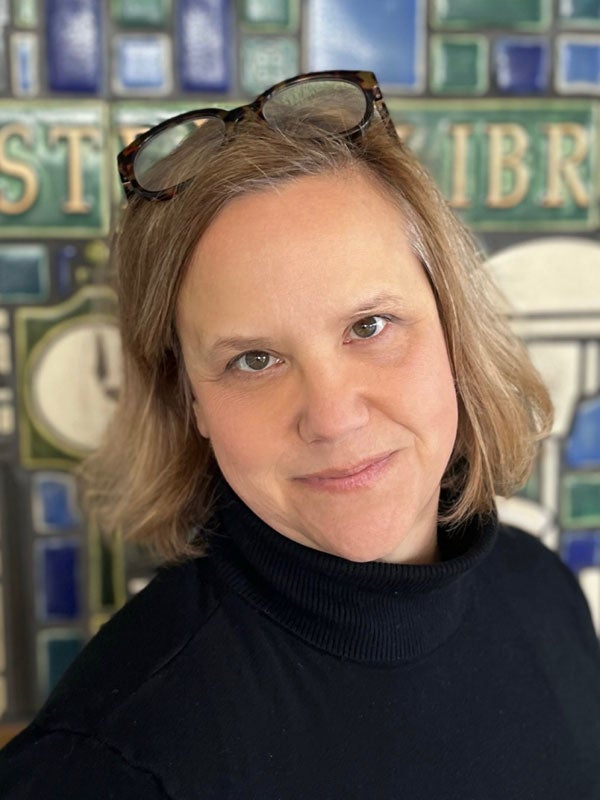
Professor, University of Michigan
Francine Banner (she/her/hers) is Professor and Chair of the Behavioral Sciences Department at UM-Dearborn. She is also an attorney. Her research explores how laws, policies, and everyday practices work against or promote social change. Her latest book, Beyond Complicity: Why We Blame Each Other Instead of Systems (UC Press, 2023), examines how individual cycles of shame, blame, and guilt detract from institutional accountability and suggests pathways toward personal healing and systemic reform.
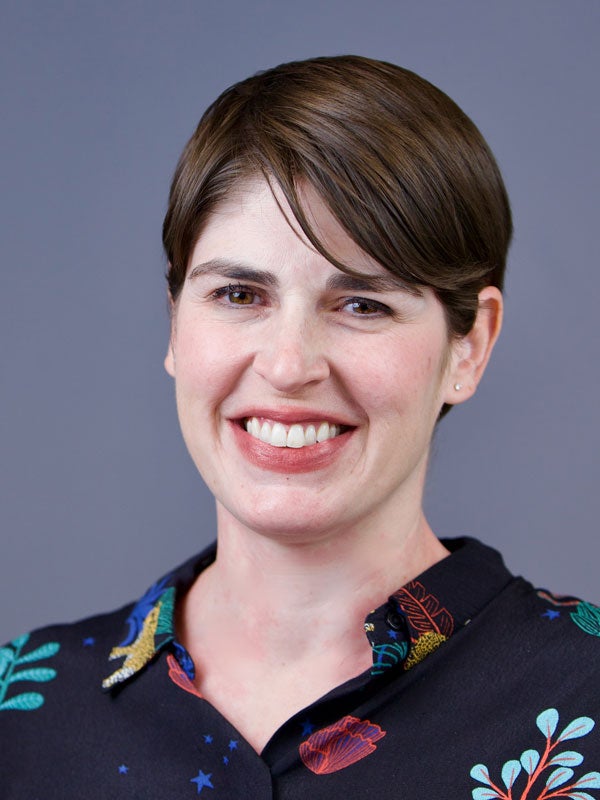
Associate Director, CRLT Theatre Program, University of Michigan
Christine Simonian Bean (she/her/hers) is the Associate Director for the CRLT Theatre Program at the University of Michigan. Her applied theatre work blends educational development and equity-focused teaching theory. Prior to working at U-M, she was an Assistant Director for Faculty Programs and Services at Columbia University’s Center for Teaching and Learning. She earned her Ph.D. in Interdisciplinary Theatre and Drama from Northwestern University in 2016 with a dissertation focused on theories of spectatorship, reality, and embodiment.
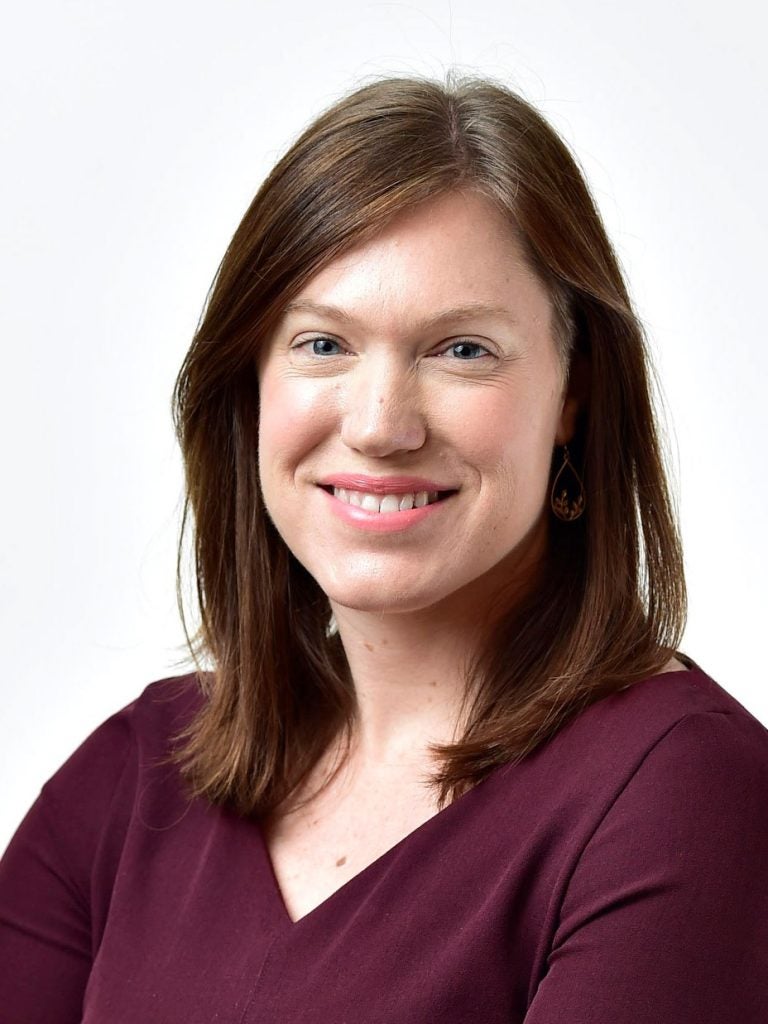
Senior Program Officer at the National Academies of Sciences, Engineering, and Medicine
Dr. Frazier Benya (she/her/hers) is a Senior Program Officer at the National Academies, where she directs the Action Collaborative on Preventing Sexual Harassment in Higher Education. Dr. Benya’s work focuses on ensuring that science, engineering, and medicine are ethical and socially responsible, both in their practice and in who gets to participate in the work. From 2016 to 2018, she served as the study director for the National Academies consensus study report Sexual Harassment of Women: Climate, Culture, and Consequences in Academic Sciences, Engineering, and Medicine. Prior to that, Dr. Benya worked with the National Academy of Engineering (NAE) on projects focused on improving and enhancing engineering ethics education and on analyzing the pathways engineers take from education to the workforce. Dr. Benya holds a B.A with honors in Science, Technology and Society from the University of Puget Sound, and a M.A. in Bioethics and Ph.D. in History of Science, Technology, and Medicine from the University of Minnesota. Dr. Benya was elected a Fellow of the American Association for the Advancement of Sciences in 2017.
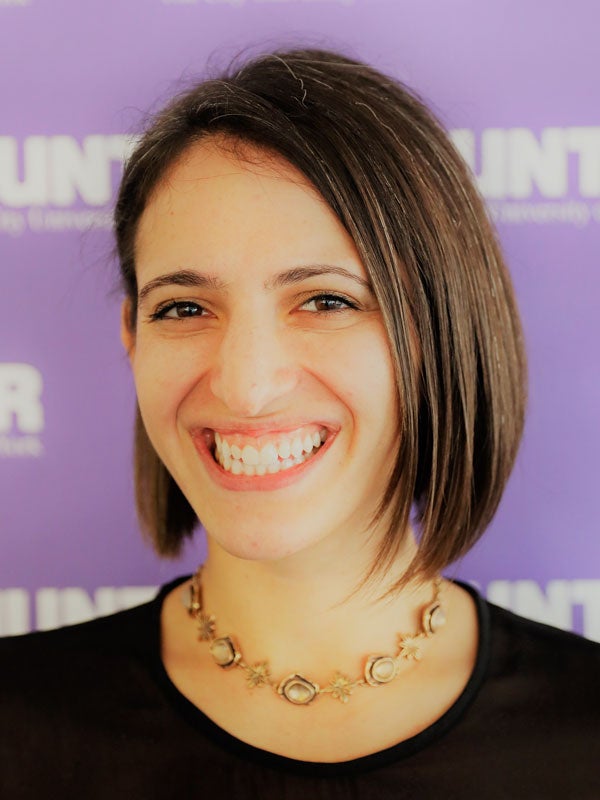
Assistant Professor, Hunter College of the City University of New York
Danielle S. Berke. Ph.D. (she/her/hers) is a clinical psychologist and Assistant Professor of Psychology at Hunter College and The Graduate Center of the City University of New York where she directs the Gender-Based Violence research laboratory. Her active program of research focuses on the identification of strategies for resisting and healing from gender-based violence among communities marginalized by systems of oppression at the intersections of racism, cisgenderism, and heterosexism. This work is both laboratory and community-based using: 1) biopsychosocial methods to specify the role of discrimination in the etiology and maintenance of trauma-related health inequities among trans and gender diverse (TGD) people and 2) community-engaged implementation science methods to tailor and deliver violence prevention and trauma recovery services with and for TGD community. A fundamental end goal of this research is to uncover the structural workings of gender-based violence to promote health equity and wellness for TGD people in all their diversity.

Assistant Professor, Ohio State University
Zoë Brigley (also Zoë Brigley Thompson)(she/they) is assistant professor (0.49) at the Ohio State University, editor of the UK journal Poetry Wales, and poetry editor at UK indie press, Seren Books. She is co-editor of Feminism, Literature, and Rape Narratives (Routledge) and has written extensively about sexual violence and healing in her recent poetry collection Hand & Skull and collection of essays Notes from a Swing State. Her most recent project was translating the Medieval proto-feminist poet, Gwerful Mechain, into English. You can read recent essays on sexual violence and healing, ‘Daphne Becoming’ in About Place, and ‘Into Eros’ in The Nasiona.
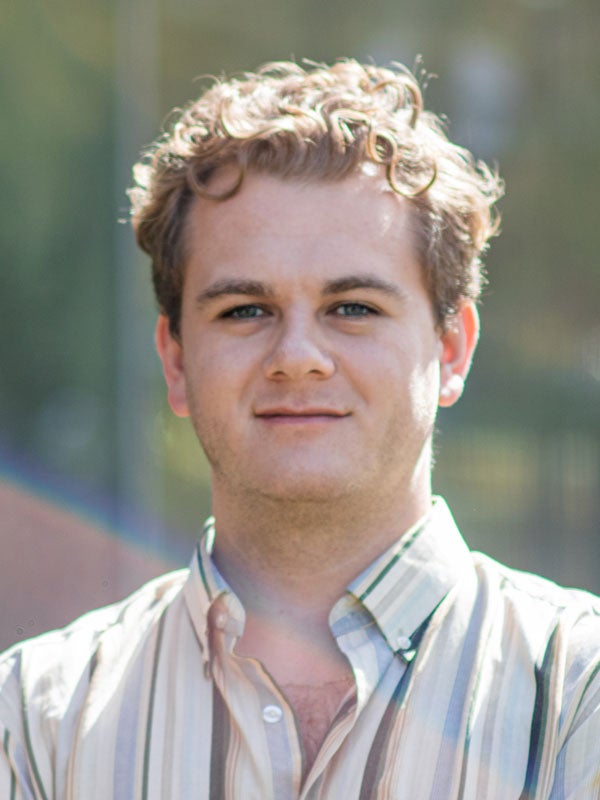
PhD Candidate in Sociology, University of Michigan
Jacob Caponi (he/him/his) is a PhD Candidate in the Department of Sociology at the University of Michigan. He studies culture and knowledge, collective violence, gender, and law. His research is broadly interested in how societies respond to atrocities and crises with a particular emphasis on creative and critical approaches to address human rights abuses. His current project, supported by the US National Science Foundation, seeks to better understand the mechanisms of healing and justice in the aftermath of genocide in Rwanda.
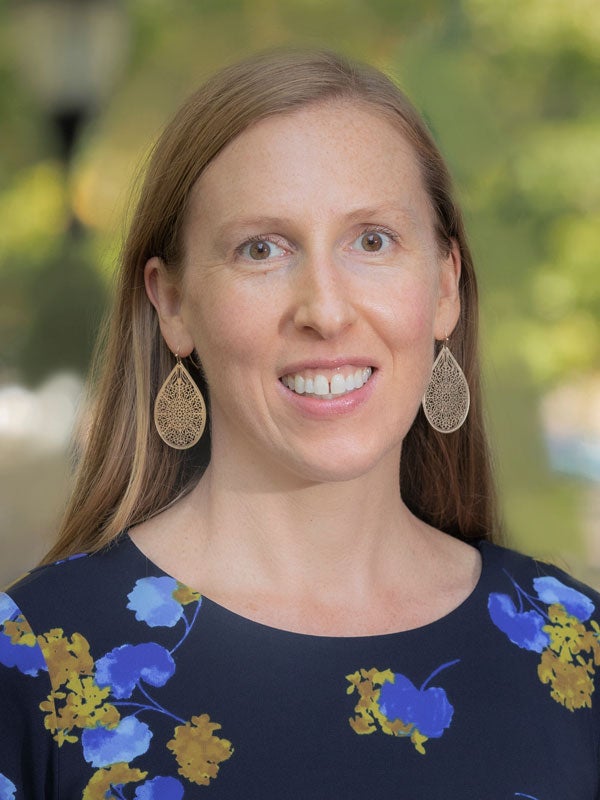
Associate Vice President for Institutional Equity, Accessibility and Belonging; University Title IX Coordinator, Yale University
Elizabeth Conklin, J.D. (she/her/hers), is the vice president for Institutional Equity, Access, and Belonging and University Title IX Coordinator. She works closely with other leaders across the university to support institutional equity and accessibility, and to guide strategy and initiatives that create a culture of belonging. She oversees the work of the Title IX Office, the Office of Institutional Equity and Accessibility, Student Accessibility Services, the Office of LGBTQ Resources, and the University Liaison for Veteran and Military Affairs. Prior to joining Yale, Elizabeth served for nearly nine years as the University of Connecticut’s associate vice president for the Office of Institutional Equity, Title IX Coordinator, and ADA Coordinator. Before her time in higher education administration, she was an associate attorney practicing labor and employment law with a Hartford law firm. Elizabeth enjoys travel, reading, live music, long walks by the sea, and spending quality time with family and friends.
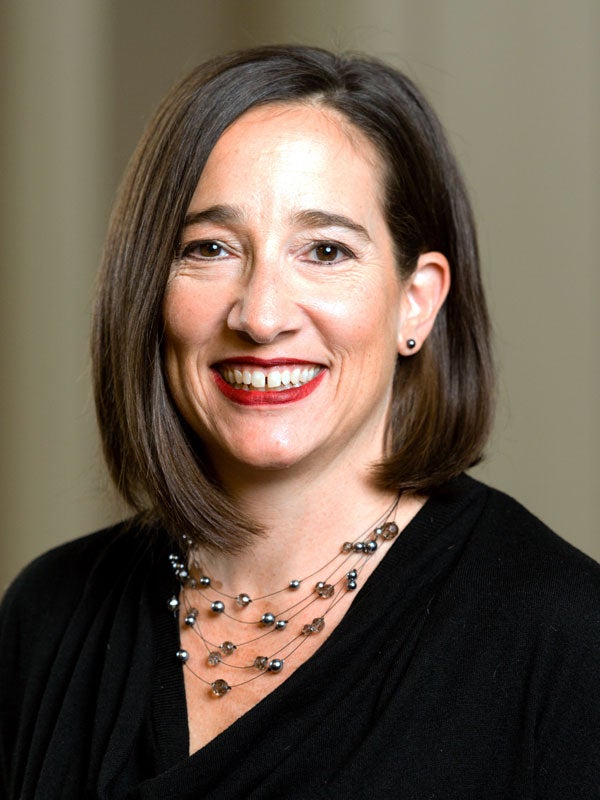
University Diversity and Social Transformation Professor of Psychology, Women’s & Gender Studies, and Management & Organizations, University of Michigan
Lilia Cortina, Ph.D. (she/her/hers), is University Diversity and Social Transformation Professor of Psychology, Women’s and Gender Studies, and Management and Organizations at the University of Michigan. An organizational psychologist, she investigates workplace experiences of harassment and incivility. To date, Dr. Cortina has published over 100 scientific works on these topics. This research has won awards, but its impact stretches beyond the walls of the academy. For instance Cortina is regularly called to serve as an expert witness, translating findings from social science to inform policy and legal decision-making. She recently joined colleagues in co-authoring a landmark report on sexual harassment for the National Academies of Sciences, Engineering, and Medicine.
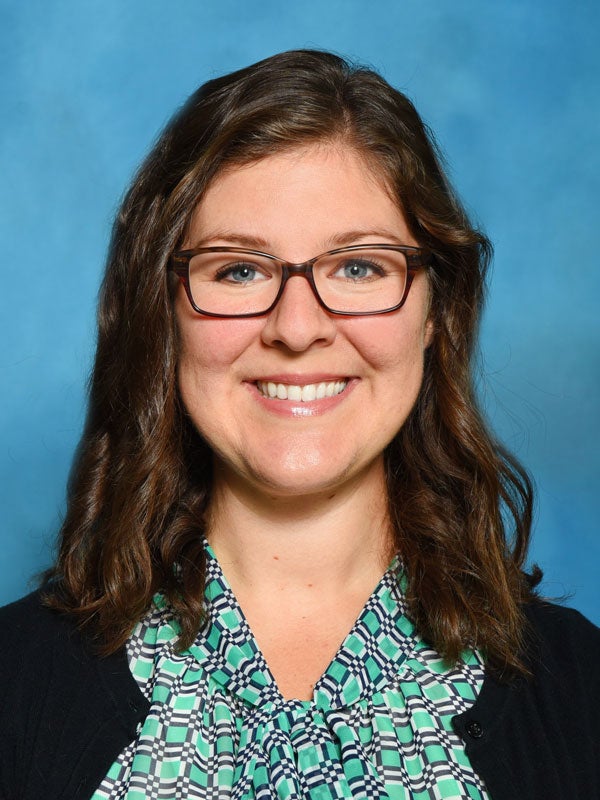
Assistant Professor, University of Michigan
Kathleen Darcy (she/her/hers) is an assistant professor in Criminology and Criminal Justice Studies at University of Michigan-Dearborn. She received her PhD from Michigan State University in Criminal Justice, law degree from Michigan State University College of Law and is licensed to practice law in Michigan. Kathleen received a Master’s degree from University of Chicago with an interdisciplinary focus on law, criminal justice, history, and human rights. Her research is interdisciplinary and primarily focuses on examining gender inequity, especially how the law impacts those affected by gender-based violence, with a focus on when abuse occurs in institutional settings (e.g., prison, higher education, the military).
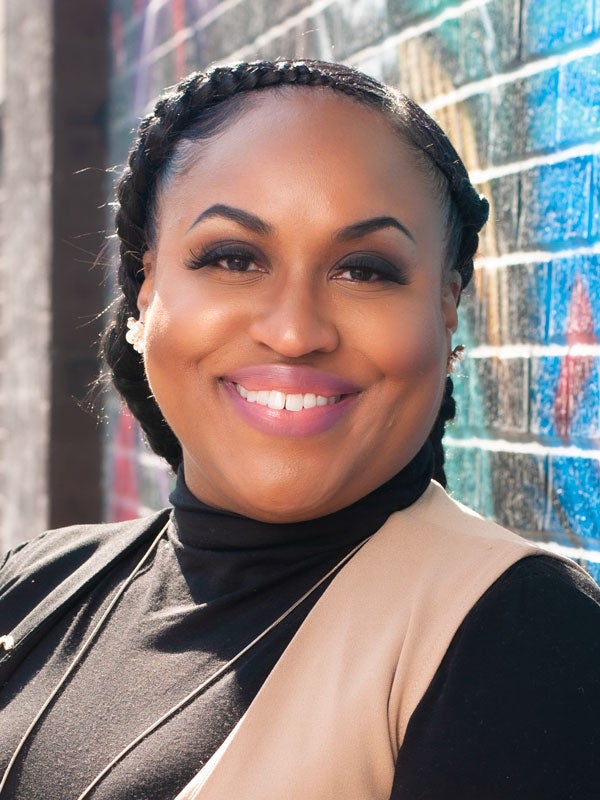
CEO & Founder, Sacred Society
Nicole (she/they) has championed campaigns such as #metoo, Women’s March, #Muterkelly, #Stopthebans, One Fair Wage, and Reproductive Freedom for All. She has also become recognized as an expert in developing advocacy services focusing on intersectionality for over 20 years for trauma survivors. Nicole has advocated for crime victims within our criminal legal system, informing best practices and protocols nationally. Nicole joined the Women’s March Detroit Host Committee, assisted in mobilizing millions of people, and was appointed Vice President of Women’s March, Michigan, shortly after the convention. Nicole also organized and led the #MuteRKelly campaign in Detroit. This Campaign led to a collaborative Anti-Human Trafficking Campaign and engaged people worldwide on the disproportionate rates of violence black girls and women experience. Nicole recently launched her own non-profit–Sacred Society. Nicole prides herself on understanding what her communities need due to her continued years of extensive outreach and advocacy. Sacred Society workshops create conversations in our community that spark change. Sacred Society’s mission is to combat trauma and oppression through art, storytelling, self-expression, and healing. Nicole believes in safety, body autonomy, access, and reproductive justice. Nicole currently serves as a board member for Planned Parenthood Advocates of Michigan. Nicole also is the Development Director for Michigan Voices. Nicole was critical in fundraising over 4 million dollars in Michigan towards issue-based advocacy and voting rights issues in 2022. Nicole thinks the most effective solution to end violence and intergenerational trauma is to create brave and inclusive spaces led by and for BIPOC (Black, Indigenous, and People of Color) individuals and services designed toward healing, learning, and liberation.
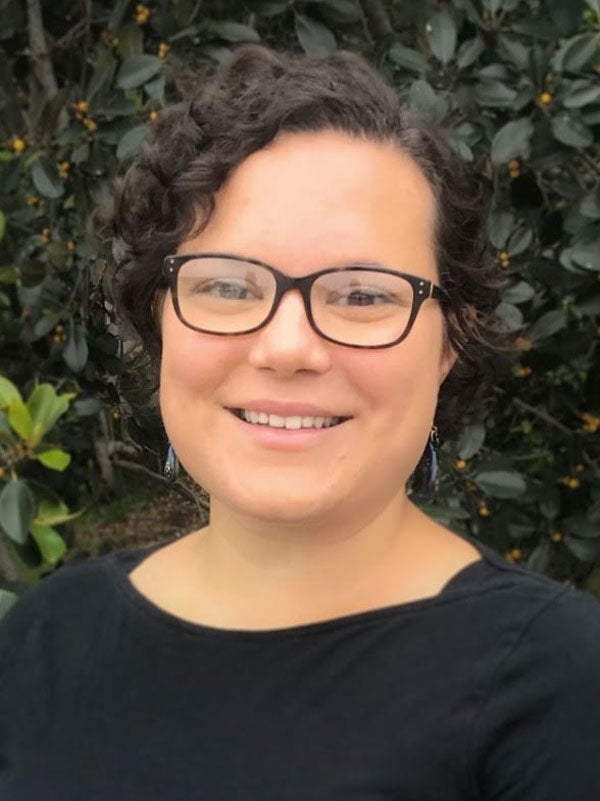
Postdoctoral Research Fellow, University of Michigan
Hannah M. Douglas, PhD (she/her/hers) is a postdoctoral research fellow in the department of psychology at the University of Michigan. She completed her masters at the University of Cincinnati in experimental psychology and her PhD at Macquarie University in Sydney, Australia. Her postdoctoral work is aimed at targeting structural barriers to success for marginalized early career scholars in academic science through organizational climate. She is particularly interested in the ways that norms of professional fields such as psychology or biology influence the day to day practices within academic departments and research collaborations including climate around authorship decisions. Broadly, Hannah’s program of research seeks to understand the experiences of those living with a stigmatized or marginalized identity to improve individual well-being and interpersonal relationships as well as enhance participation in organizational and academic settings. For example, she has used survey methods, social media data, and experimental methods to study how people disclose prior victimization and experiences of sexual violence in the workplace, in close relationships, and through wide scale social media movements such as #MeToo.
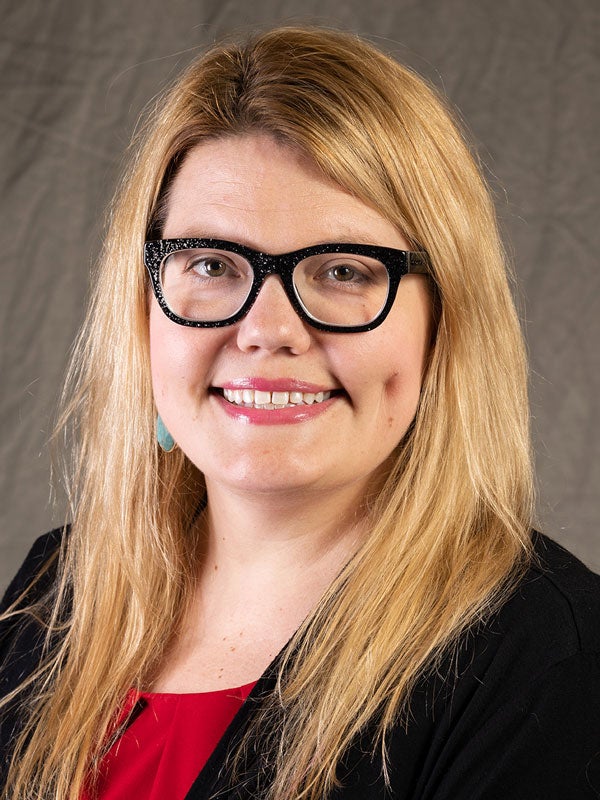
Associate Professor, University of Nebraska Lincoln
Dr. Katie Edwards, Ph.D., (she/her/hers) is an Associate Professor at the University of Nebraska—Lincoln where she directs the Interpersonal Violence Research Laboratory. Using community-based participatory action research, Dr. Edwards seeks to answer two questions in her work: (1) How do we prevent sexual and related forms of violence? and (2) How do we most effectively support survivors in the aftermath of violent victimization? Much of Dr. Edwards work focuses on minoritized populations, specifically Native American/Indigenous youth and families as well as LGBTQ2S+ youth and emerging adults. Dr. Edwards highly values community leadership in developing and evaluating strengths-focused, affirming, culturally grounded initiatives to prevent and respond to sexual and related forms of violence. To date, she has published more than 200 peer reviewed journal articles, and over the past 10 years has accrued over 22 million dollars in funding for her research, predominantly from federal (U.S.) agencies.
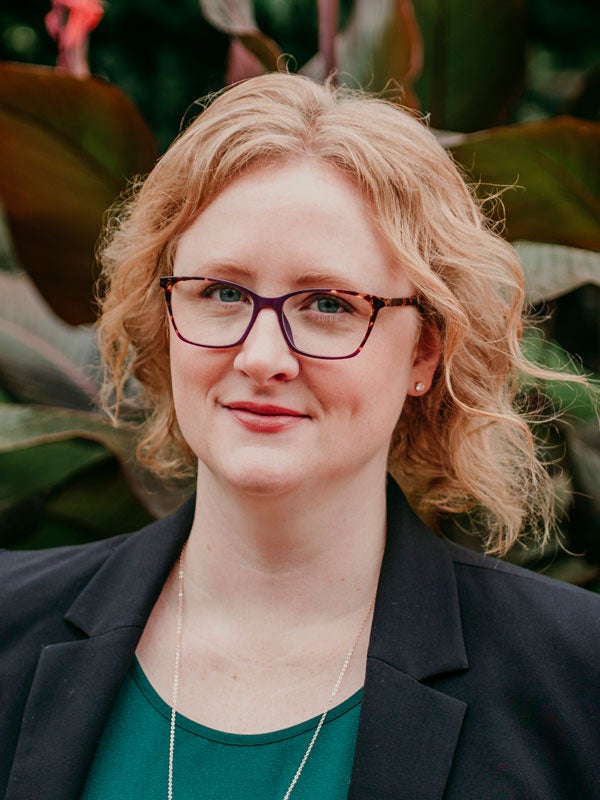
Interim Deputy Director of University Health and Wellbeing and Director of MSU Center for Survivors, Michigan State University
Tana Fedewa, LMSW (she/her/hers) is Interim Deputy Director of University Health and Wellbeing and the Director of the Michigan State University Center for Survivors. She is a licensed clinical social worker who advocates for trauma-informed services, response, and interventions on campus and in the community. Tana has served on the Michigan State University Relationship Violence and Sexual Misconduct Expert Advisory Workgroup since 2018. Tana was a recipient of a Robert Wood Johnson Foundation Clinical Scholars Fellowship in 2019 centering on health equity and leadership. She values working in a collaborative, innovative, and multi-disciplinary environment at MSU.
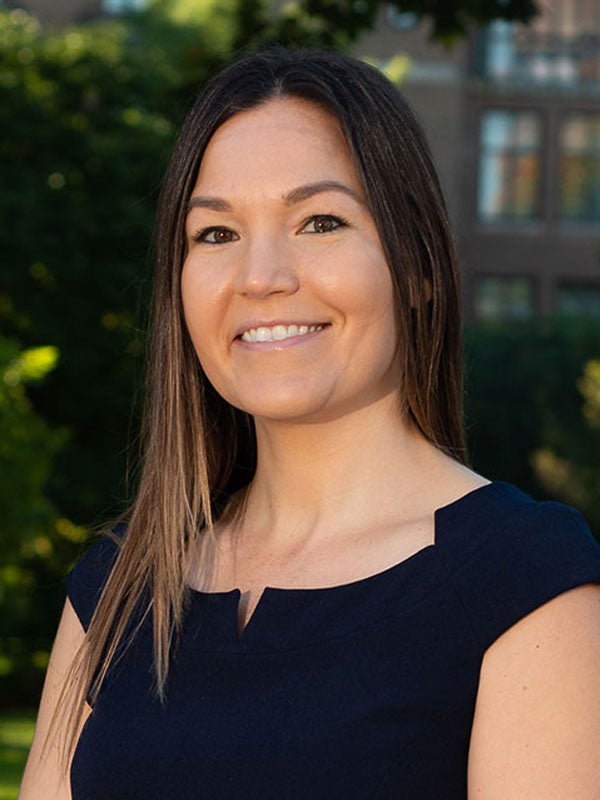
Assistant Professor, University of Michigan
Dr. Lisa Fedina (she/her/hers) is an assistant professor at the School of Social Work. Her research investigates the connections between forms of violence across the lifespan (e.g., child maltreatment, intimate partner violence, sexual assault), health and mental health outcomes. Her current studies examine risk and protective factors for campus sexual assault and profiles of victimization and suicide risk among emerging adults. She is particularly interested in understanding how social policies and structural factors lead to inequalities in violence and health, and improving the criminal justice and healthcare system’s response to gender-based violence. Fedina’s research has been funded by the American Foundation for Suicide Prevention, the National Institute on Aging, and the National Institute of Justice at the U.S. Department of Justice. Her research has been published in top peer-reviewed journals (e.g., American Journal of Public Health, Annual Review of Clinical Psychology) and has been featured in outlets such as USA Today and Psychology Today. Fedina has served on local and federal task forces to develop policy guidance on issues related to violence, including the White House Task Force to Protect Students from Sexual Assault. Her social work practice background is in community organizing, policy advocacy and direct services to survivors of sexual assault, intimate partner violence and human trafficking.
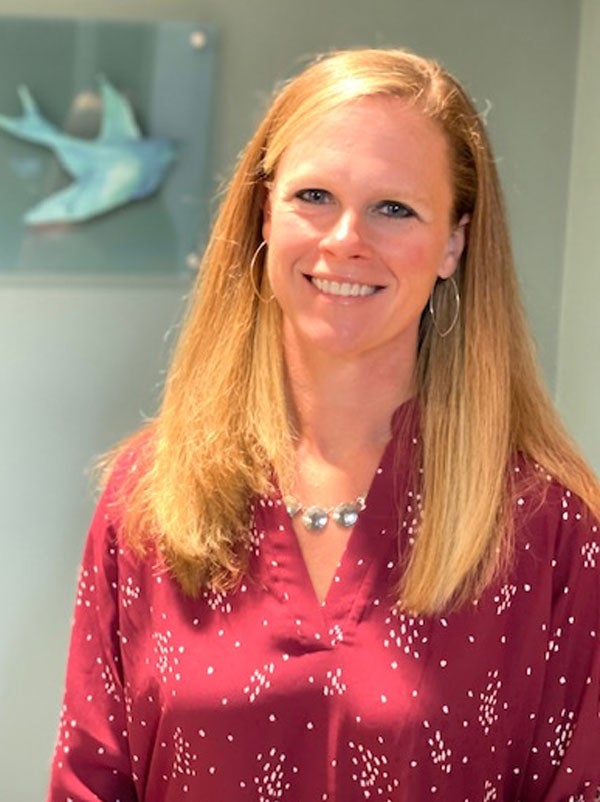
Associate Director/Lead SANE, Michigan State University
Danielle Fenton (she/her/hers) is the Associate Director and Lead Sexual Assault Nurse Examiner at Michigan State University’s Sexual Assault Healthcare Program. Ms. Fenton is an active member of the campus Sexual Assault Response Team. She has a diverse history in nursing care including Intensive Care, Chronic Pain Management, and as a circulator in the operating room. Ms. Fenton has a Bachelor of Science degree in Human Biology from the University of Indianapolis, a Bachelor of Science degree in Nursing from the University of Detroit, and a Master of Nursing degree from Xavier University, where she focused on forensic nursing. Ms. Fenton has presented for several municipalities, multiple University programs, at the 2023 National Association of Student Personnel Administrators Strategies conference, and at the 2023 End Violence Against Women International conference. Her expertise is to promote and discuss various elements of MSU’s Sexual Assault Healthcare Program and how it can benefit students and the area community members. She also helped co-author an article published in the Journal of Forensic Nursing.
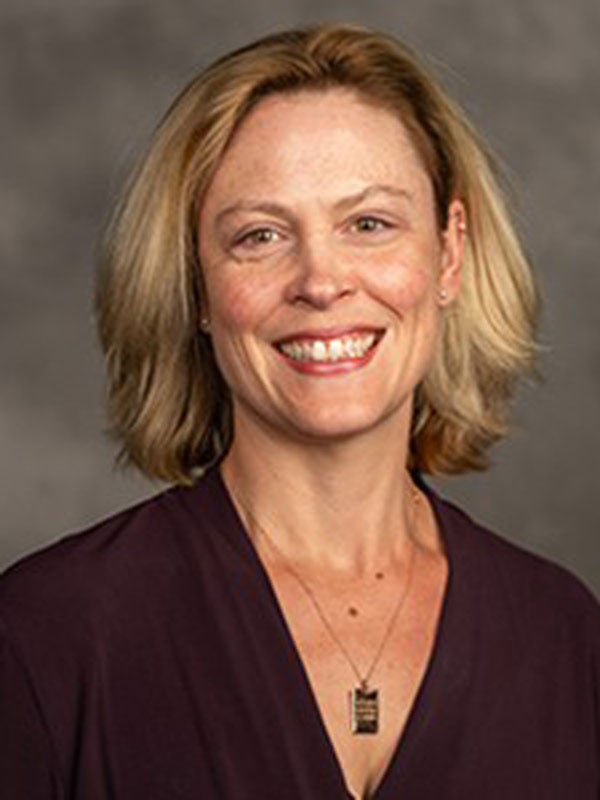
Clinical Assistant Professor, University of Michigan
Laura Gültekin, Ph.D., FNP-BC, (she/her/hers) is a clinical assistant professor in the University of Michigan School of Nursing. Her research and scholarly expertise focus on families experiencing homelessness, trauma and ACE that contribute to housing instability, and trauma-informed care. As a clinician, she practices at Hope Clinic in Ypsilanti providing primary care services to individuals and families with no health insurance, as serves as Nurse Navigator at Marygrove Early Education Center in Detroit. Dr. Gültekin is faculty in the Acute Care Pediatric Nurse Practitioner program, and teaches in the UMSN Doctorate of Nursing Practice program. She is the co-leader of UMSN’s Complex ACEs, Complex Aid (CAsCAid) research collaborative.
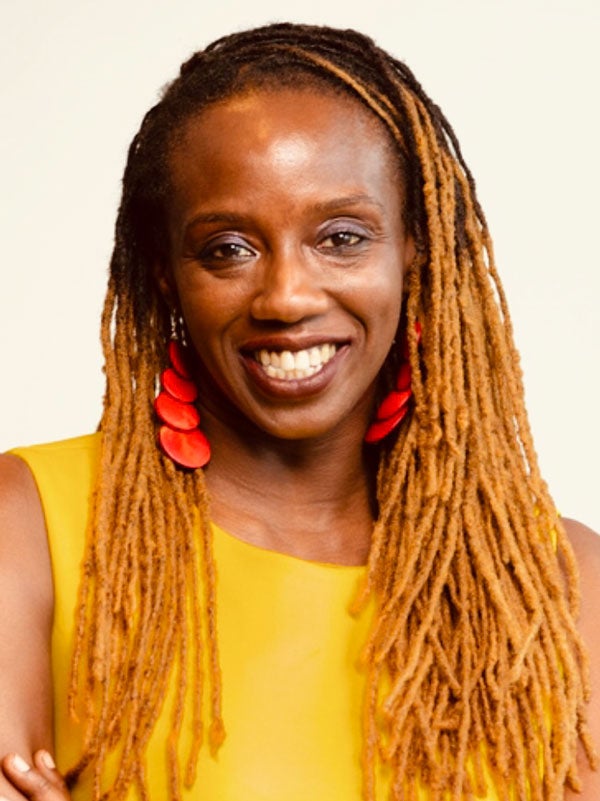
Manager of Adaptable Resolution and Restorative, MIT
Nina (she/her/hers) is an equity and violence prevention advocate, educator, and restorative justice practitioner with over twenty years of experience in higher education administration and student and community engagement. She has provided crisis and resource counseling for thousands of survivors of
gender-based interpersonal/sexual violence and identity-based harm & harassment as well as facilitated individual and community-wide peacebuilding and restorative processes. Her practice anchors around frameworks of anti-racism/anti-oppression, leadership development, strength and resilience building and trauma-informed praxis. She has formerly held the roles of advocate, crisis counselor, program manager, educator andTIX/conduct case manager at Harvard University, Swarthmore College, theUniversity of Pennsylvania and Massachusetts Institute of Technology.
As a consultant, she has worked with dozens of institutions to provide innovative and engaging educational programming, facilitate restorative dialogues, provide professional development, technical assistance, professional coaching and expert consultation for strategic initiatives. As a campus administrator, she has worked tirelessly to help educational institutions cultivate compassionate and transformative campuses actively engaged in violence prevention and healthy, inclusive community building. Nina Harris currently serves as the Manager of Adaptable Resolutions and Director of Restorative Practices at MIT’s Institute Discrimination Harassment and Response Office (IDHR) and the Institute Community & Equity Office (ICEO), respectively. She is also the principal consultant and facilitator of Restorative Vision, LLC and affiliate with the University of San Diego’s Center for Restorative Justice.
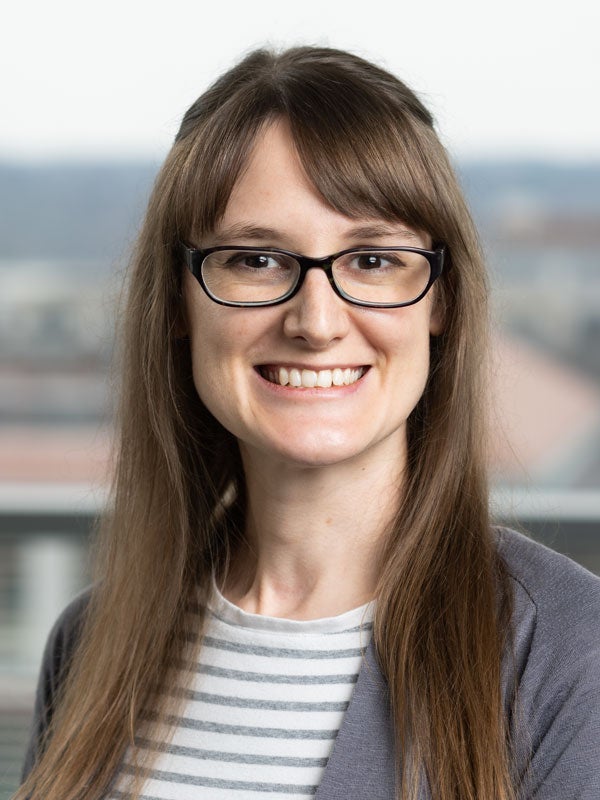
Assessment Specialist, University of Michigan
Hayley Heaton (she/her/hers) is an Assessment Specialist at U-M’s Center for Research on Learning and Teaching. She works with faculty and staff to assess a wide range of questions at the program and course levels. She has built and analyzed assessments of unit and university programming using quantitative and qualitative methods and has facilitated workshops on equitable assessment practices. Before coming to CRLT, she worked as a lecturer in the Linguistics department and assisted with multiple research projects at the university. She earned her PhD in Linguistics from U-M in 2018.
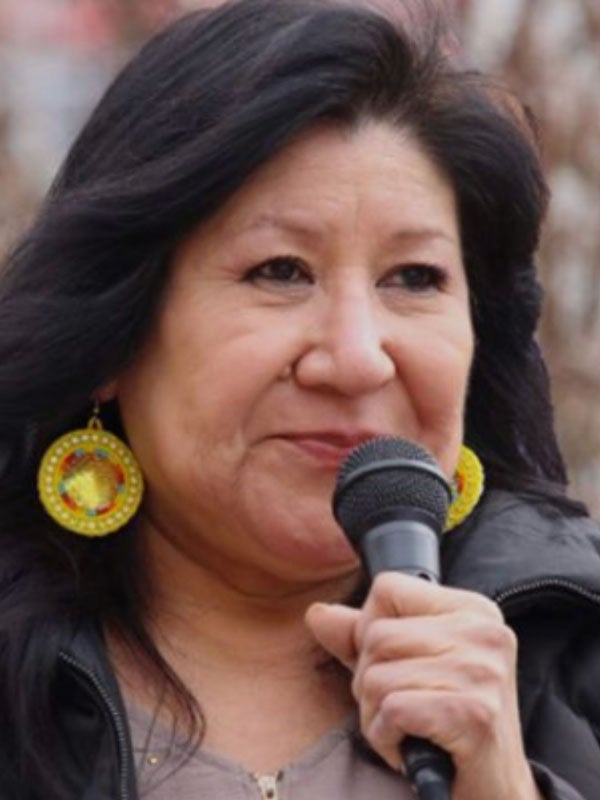
Cultural Outreach Manager, University of Nebraska Lincoln
Ramona Herrington (she/her/hers) is Oglala Lakota from the Pine Ridge reservation in the Black Hills/Paha Sapa, Oceti Sakowin territory. She has worked as a community organizer, protester, and facilitator. Ramona is the co-founder of a non-profit organization called COUP (community organizing for unified power). They help community relatives with eviction, racist incidents, and creating housing solutions. She has worked with Dr. Edwards for 6 years and enjoys working with the youth and families.
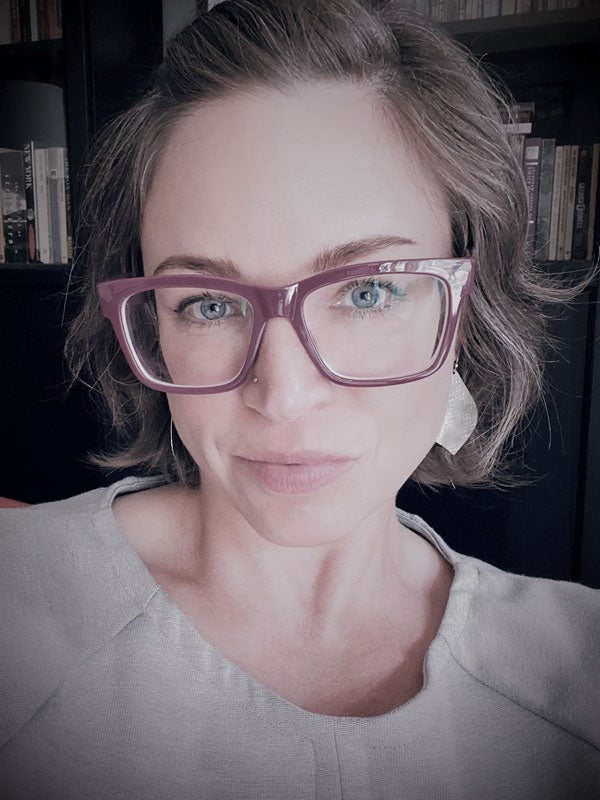
Professor, Marquette University
Heather R. Hlavka (she/her/hers) is Professor of Criminology and Law Studies in the department of Social and Cultural Sciences at Marquette University. Her teaching/research interests include sexual violence, sex and gender, socio-legal studies, youth, trauma, and feminist embodiment and research ethics. An interdisciplinary scholar, activist, and advocate, her research portfolio includes solo and collaborative projects on gender and violence. She was awarded a NSF grant to complete research published in her book (with S. Mulla) Bodies in Evidence: Race, Gender, and Science in Sexual Assault Adjudication (NYU Press, 2021) which was awarded the Senior Book Prize by the American Ethnological Society and Honorable Mention for the Senior Book Prize by the Association for Feminist Anthropology. She is also co-editor (with A. Petillo) of Research Gender-Based Violence: Embodied and Intersectional Approaches (NYU Press, 2022) and her other published work has been featured in Gender & Society, Law & Society, Law & Social Inquiry, Men and Masculinities, Violence Against Women, and in public outlets such as the Gender Policy Report, New Republic, Think Progress, Salon, and Wisconsin Public Radio. Recent work includes research on domestic violence during COVID-19 and participatory action research on gender, trauma, and embodiment supported by the Institute for Women’s Leadership (IWL) at Marquette University. She is affiliated research faculty and advisory board member for the IWL; Associate Fellow of SHaME; Co-Chair of the Social Action Committee, Sociologists for Women in Society (SWS); and on-call advocate for Marquette’s Sexual Assault Advocacy Network.
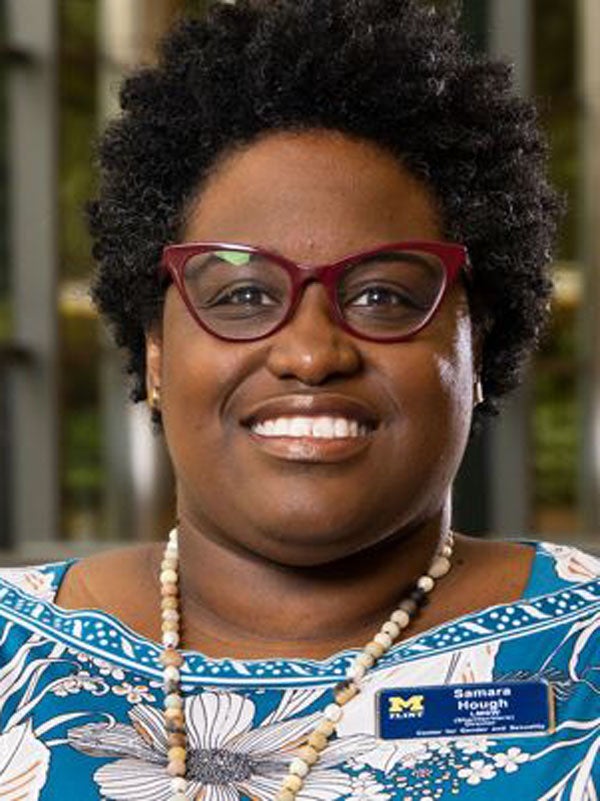
Director, University of Michigan-Flint
Samara Hough (she/her/hers) is a Licensed Clinical Social Worker with professional experience in nonprofit and higher education sectors. She currently serves as Director of the University of Michigan Flint Center for Gender and Sexuality where she leads advocacy efforts across the campus community to support women, survivors and members of the LGBTQIA2S+ community. Samara is Board President of the Michigan Coalition to End Domestic and Sexual Violence and Co-chair of the Genesee County Sexual Assault Response Team. She received her bachelor’s in Women Studies and Psychology from the University of Michigan and her Master’s in Social Work from Wayne State University.
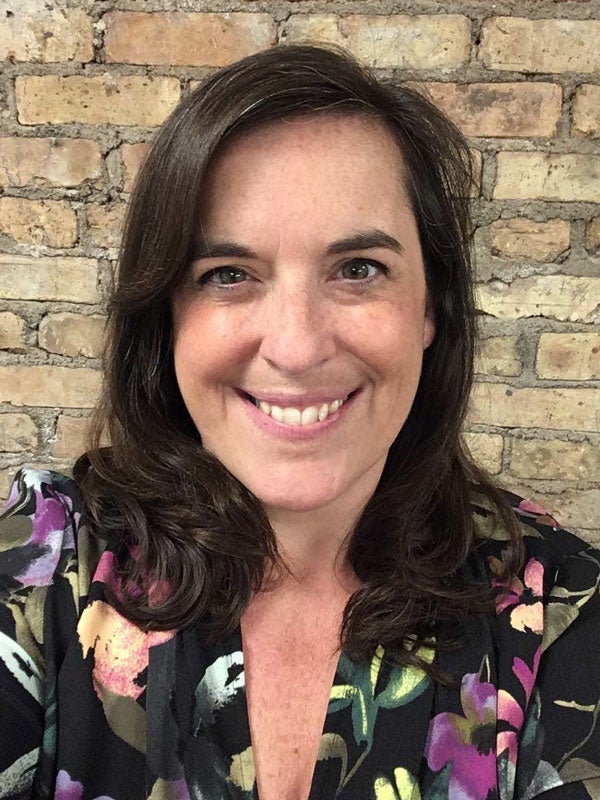
Director of Sexual Assault Prevention and Awareness Center (SAPAC), University of Michigan
Anne Huhman (she/her), MSW is the Director of the University of Michigan’s Sexual Assault Prevention and Awareness Center (SAPAC). She earned her Bachelor of Arts degree from the University of Wisconsin-Madison, majoring in Journalism and Strategic Communication, and her Master’s degree in Social Work from the University of Michigan, concentrating in Community Organizing. Anne has worked at SAPAC for 17 years and has held six different professional roles throughout that time. She provides strategic direction for the office, manages the day-to-day operations, and oversees all of the unit’s prevention education, survivor support, student leadership development and training, and community outreach and engagement efforts. She helps lead the institution in its sexual misconduct prevention, survivor support, and holistic wellness efforts through the Coordinated Community Response Team and the Well-Being Collective. Anne helped create Relationship Remix, the sexual violence prevention program that is required for all first-year undergraduate students at the University of Michigan, and continues to provide leadership for required sexual violence prevention programming for incoming students at U-M. Anne is passionate about culture change and working collaboratively towards creating healthy, inclusive, respectful, and socially just communities.

Director for Research Development, Institute for Research on Women and Gender, University of Michigan
Rebecca Shea Irvine (she/her) has served as the Director for Research Development in the Institute for Research on Women and Gender (IRWG) at the University of Michigan since 2021. Prior to joining IRWG, Rebecca held a joint appointment in the Center for Gender in Global Context and Global Innovations in Development, Engagement, and Scholarship (Global IDEAS) at Michigan State University. She has supported over 50 grant proposals ranging in size from a few thousand dollars to $15 million from funding agencies including NSF, NIH, NEH, various government departments and agencies, Global Affairs Canada, the European Commission, National Geographic, Social Science Research Council, Robert Wood Johnson Foundation, and Russell Sage Foundation, among others. Rebecca has also contributed to numerous funded projects as a researcher focused on issues related to gender, disability, and inclusion and has served as a consultant for the United Nations Development Program (UNDP), multiple Northern Irish government departments and agencies, Inclusion Europe, Plan International, CGIAR, and various other international NGOs. Rebecca holds a B.A. in International Relations (James Madison College at Michigan State University), an M.A. in Comparative Ethnic Conflict and a Ph.D. in Sociology and Social Policy (both from Queen’s University Belfast). She identifies as a disabled woman of mixed European and Ojibwe heritage and holds citizenship rights and responsibilities in the United States, United Kingdom, and Sault Ste. Marie Tribe of Chippewa Indians.
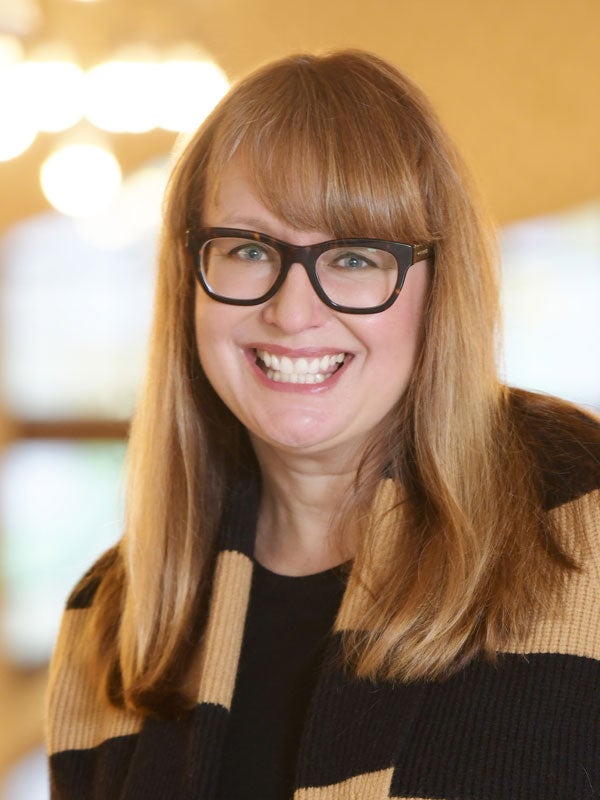
Sr. Director of Research Development, University of Michigan
Jill Jividen (she/her/hers) joined OVPR in 2019 to establish the Research Development and Proposal Services unit, which supports faculty in pursuing external research funding across U-M’s three campuses. The RDPS team provides proposal management and editing services, facilitation of ideation and strategic planning sessions, and workshops and webinars for improving the quality of grant proposals and building research capacity. In addition, team members support the Bold Challenges initiative. Jividen holds degrees in journalism, English and American Literature from Michigan State University (B.A.), New York University (M.A.) and the University of South Carolina (Ph.D.). Her career at U-M began in 2010; she has supported researchers in the Medical School, School of Information, and the Institute for Research on Women & Gender. Jividen has served on the Board of Directors of the National Organization of Research Development Professionals (NORDP) since 2018 and was the 2021-22 NORDP President.
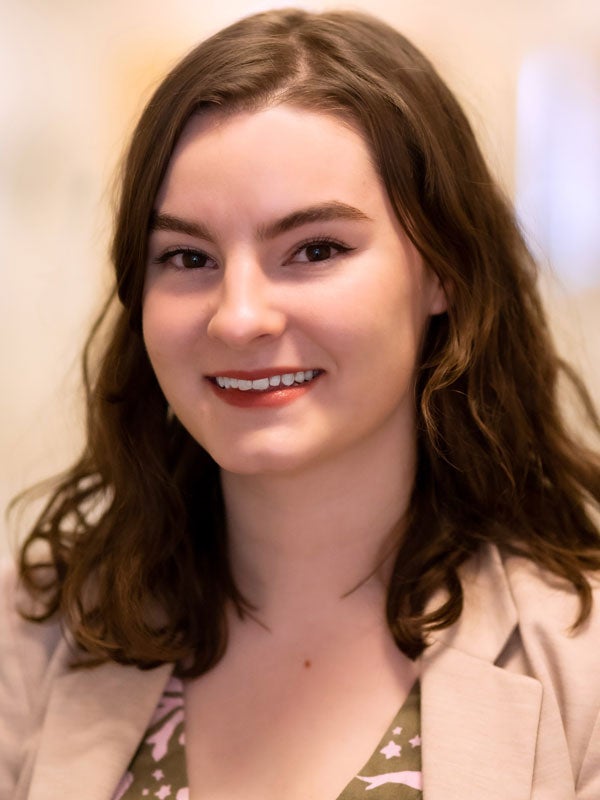
Assistant Director of Sexual Violence Response, CARE (Center for Awareness, Response, & Education), Northwestern University
Katelyn Kennon (she/they) is the Assistant Director of Sexual Violence Response Services at the Center for Awareness, Response, & Education (CARE) at Northwestern University, where they provide confidential, survivor-centered support and advocacy to Northwestern students and collaborate on macro-level initiatives to support survivors. She is also the advisor of SPEAK (Students Promoting Education, Awareness, and Knowledge) for Change, a student organization dedicated to activism and advocacy towards ending gender-based violence.
Katelyn first became involved in organizing, research, and peer prevention education around sexual and relationship harm while an undergraduate at the University of Arizona. Later, they worked and volunteered in Arizona and Michigan responding to survivors’ crisis line calls and emergency department visits. Prior to coming to Northwestern, Katelyn filled several prevention and advocacy-focused roles at SAPAC (Sexual Assault Prevention and Awareness Center) at the University of Michigan, where she also earned her MSW and continues to work toward her PhD in social work and sociology.
Katelyn is especially passionate about restorative and transformative justice, criminalized survivors, disability justice, harm reduction, and addressing the needs of graduate and professional students. She is committed to drawing connections between structural and interpersonal violence and foregrounding the experiences of marginalized survivors.
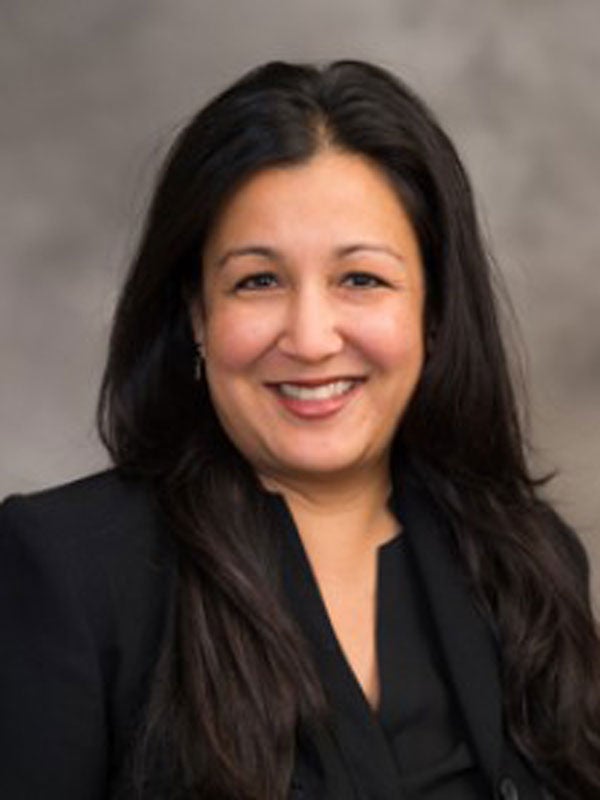
Assistant Professor, University of Michigan
Yasamin Kusunoki (she/her/hers) is an Assistant Professor at the School of Nursing and a Faculty Associate at the Population Studies Center at the Institute for Social Research at the University of Michigan. She received her Ph.D. in Public Health from the University of California, Los Angeles, followed by an NICHD postdoctoral fellowship at the Population Studies Center at the University of Michigan. Her research focuses on understanding and addressing sources of existing disparities in reproductive health behaviors and outcomes, particularly the role of social contexts such as intimate relationships, families, and communities. Current investigations include the influence of multiple, dynamic social contexts on young women’s risk of unintended pregnancy; the correlates and consequences of intimate partner violence victimization and reproductive coercion among young women; sexual violence victimization and perpetration among adolescents and young adults; and the integration of intimate partner violence interventions within reproductive health settings and substance use treatment services.
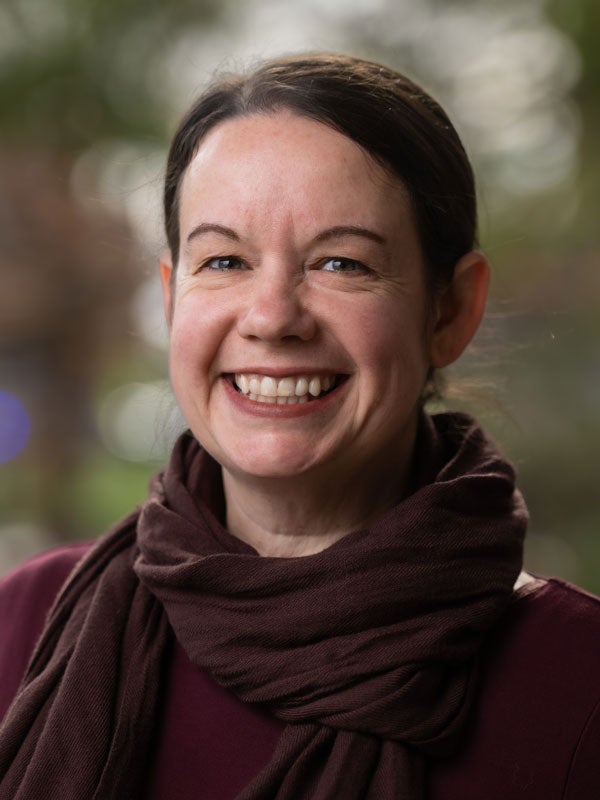
Adaptable Resolution and Restorative Practices Lead, University of Michigan
Carrie Landrum (she/they) is the Adaptable Resolution and Restorative Practices Lead within the Equity, Civil Rights, and Title IX Office (ECRT) and PEAR (Prevention Education, Assistance and Resources) department at the University of Michigan (U-M). Carrie has facilitated restorative responses to campus harms since 2007, including for cases of sexual and gender-based harms since 2013. She served as the Adaptable Resolution Coordinator who facilitated restorative adaptable resolutions under the U-M Sexual and Gender-Based Misconduct Policy for cases involving students, and is now advancing this work with faculty and staff who are interested in restoratively addressing harms that may or may not fall under campus policies. Carrie has deep expertise in peacebuilding and conflict transformation, healing justice, restorative peacemaking practices, trauma healing & healing-centered engagement, and a variety of healing arts; she is an internationally known facilitator and trainer on these and related topics.
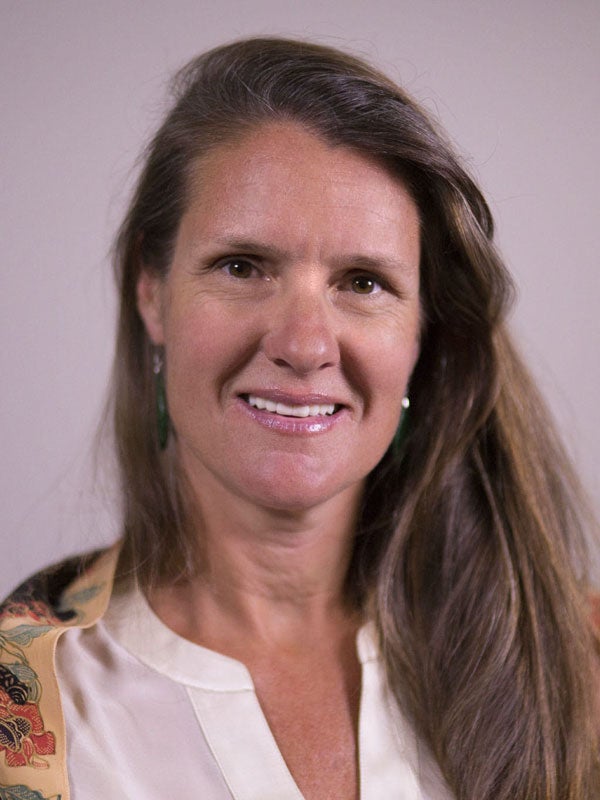
Research Affiliate, University of Michigan
Lisa Young Larance, PhD, MSW, LCSW, (she/her/hers) is a practitioner-researcher with wide-ranging clinical, community, and prison-based practice experience. Her direct service work includes providing individual trauma-informed therapy and co-facilitating intervention groups. Dr. Young Larance’s macro-social work practice is rooted in meeting organizational and community needs while serving violence-involved families. She is known globally for being an anti-violence intervention pioneer who created foundational and innovative community-based programming for diverse women with domestic and sexual violence survivorship histories brought to systems attention for their use of non-fatal force. She also co-developed and implemented Meridians for Incarcerated Women serving women housed in Michigan Department of Corrections facilities. Dr. Young Larance’s extensive consulting work includes the New Mexico Coalition Against Domestic Violence (U.S.A.), Harmony House’s Nurturing Hearts Violence Prevention Program (Hong Kong, China), the +SHIFT Program (Victoria, Australia), and the United States Air Force’s Family Advocacy Program (Global). Her leading-edge scholarship focuses primarily on understanding systems-involved women’s legal, child protection, and anti violence intervention experiences. Dr. Young Larance investigates how women’s institutional contact can both replicate intimate harm and facilitate positive change. Her insightful work emphasizes the strategies women employ to navigate surveilling systems and their agency in healing from trauma while creating community. She is widely published, most notably in Affilia: Feminist Inquiry in Social Work, BMJ Open, International Social Work, Journal of Interpersonal Violence, Psychology of Violence, and Violence Against Women. Summer 2023 Dr. Young Larance will begin an assistant professor position at Bryn Mawr College Graduate School of Social Work and Social Research.
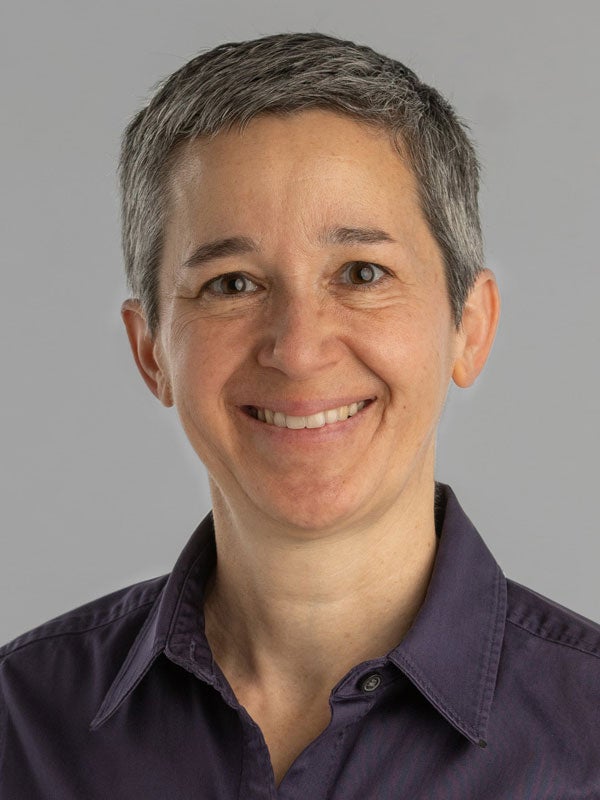
Arthur F. Thurnau Professor and Associate Professor, University of Michigan
Sandra Levitsky (she/her/hers) is an Arthur F. Thurnau Professor and Associate Professor of Sociology. She holds a Ph.D. in Sociology from the University of Wisconsin and a J.D. from the University of Minnesota. Her research focuses on gender, American social policy, political mobilization, and the relationship between law and social change. She is currently leading (with her colleague Professor Elizabeth Armstrong) a study funded by the National Science Foundation that analyzes how colleges and universities are responding to political and legal pressure to address the persistent problem of sexual violence on campus. She is also a Co-Chair of UM’s Coordinated Community Response Team.
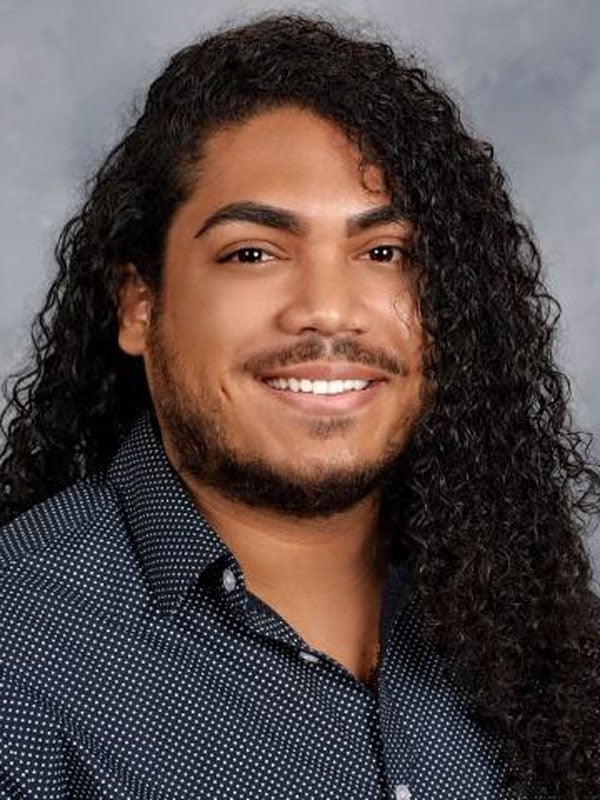
Assistant Professor, University of Michigan
Dr. Jean-Carlos Lopez (he/him/his) is an Assistant Professor in the College of Education Health and Human Services. He is an alumnus of Cornell University and the University of Pennsylvania where he studied Communication research and Mental Health Counseling respectively. He continued his education at the University of Florida where he obtained both his Specialist and Ph.D. degrees in Mental Health Counseling and Counselor Education. His research work explores the lived experiences of individuals at multiply stigmatized intersections. Currently, he investigates how masculine gender performance mediates intimate partner violence in the Spanish-Speaking Caribbean.
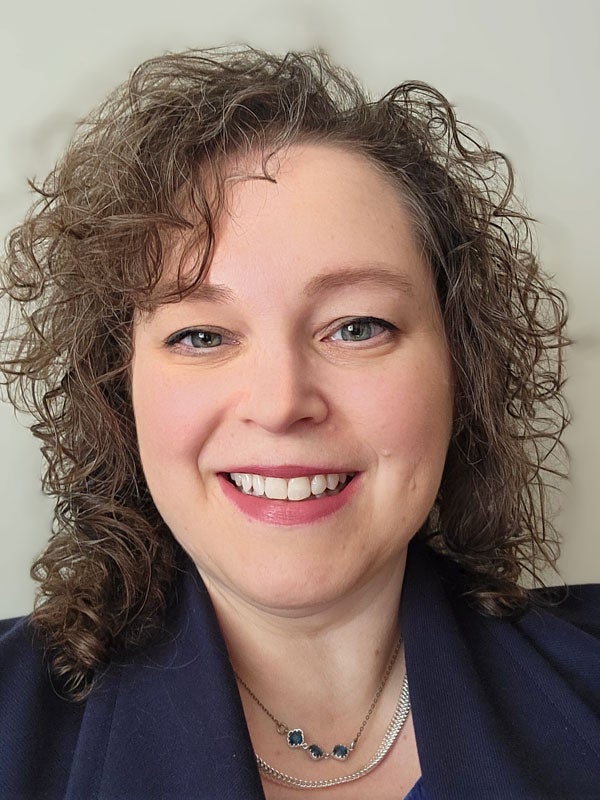
Professor and Chair, Department Health and Human Services, University of Michigan
Lisa Martin, Ph.D. (she/her/hers) is a Professor at the University of Michigan Dearborn where she and holds joint appointments in Women’s and Gender Studies and Health & Human Services. She currently serves as the Department Chair for Health and Human Services and previously served as Director of the Women’s and Gender Studies. She earned her doctorate in Public Health in Health Behavior & Health Education Department from the University of Michigan. She also holds a master’s degree in Gender & Cultural Studies from Simmons College. Professor Martin’s area of research is in gender and health, stigma, and sexual and reproductive health. She values interdisciplinary collaborations in all her research endeavors. Example projects include the Research on Institutional Betrayal project which examines the tensions between higher education institutions’ practices towards creating inclusive spaces free from gender-based harassment and assault and employees’ perspectives and experiences on those efforts. For more than 16 years, she has been part of an interdisciplinary team that has worked with healthcare workers using a group-based intervention for abortion care workers, known as the Providers Share Workshop. Her research includes facilitated workshops that employ grounded theory methods and survey design techniques.
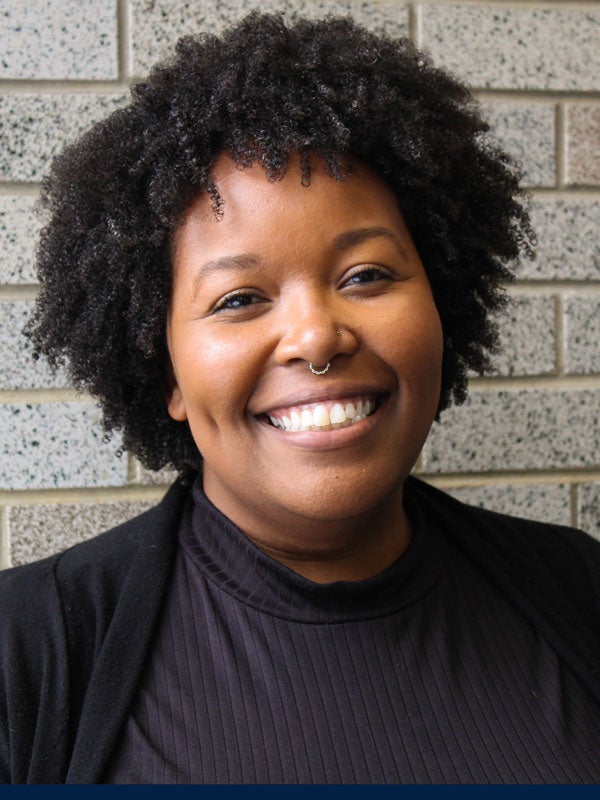
Assistant Director for Sexual Misconduct Education & Processes, OSCR (Office of Student Conflict Resolution), University of Michigan
Felicia McCrary, L.M.S.W., (she/her/hers) serves as the Assistant Director for Sexual and Gender-Based Misconduct Programs in the Office of Student Conflict Resolution (OSCR) at the University of Michigan, Ann Arbor. For the past two years in OSCR, she has overseen the facilitation and coordination of the Science-based Treatment, Accountability, and Risk Reduction for Sexual Assault (STARRSA) Active Psychoeducation (AP) Program, the leading, empirically-informed program for students found responsible for sexual and gender-based misconduct and those interested in developing attitudes and skills that promote wellness-focused, consensual, and safe intimate relationships and sexual behaviors. Currently, her leadership in OSCR has expanded to support students who participate and the staff who facilitate Adaptable Resolution and Post-Suspension Review and Reintegration. In all areas of her work, Felicia seeks to guide students in paths of learning, healing, self-advocacy, and transformation, ultimately to their individual paths of peace. Felicia holds a Master’s of Social Work from the University of Michigan, Ann Arbor.
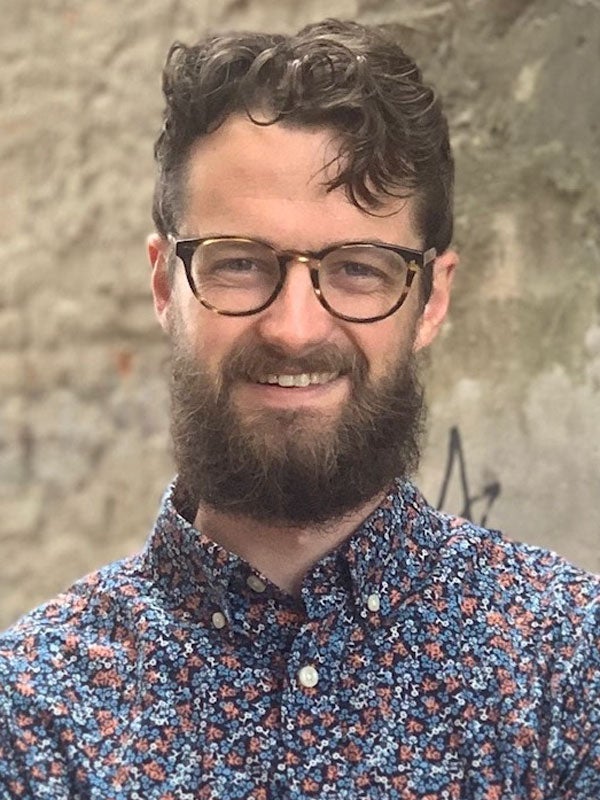
Assistant Director of Survivor Support & Advocacy, University of Michigan
Jim McEvilly, LMSW (he/him/his) serves as the Assistant Director of Survivor Support & Advocacy with the Sexual Assault Prevention and Awareness Center (SAPAC) at the University of Michigan (U-M) Ann Arbor. Within his role at SAPAC Jim provides direct advocacy/case management services to his clients while also providing direct support & supervision to the SAPAC Survivor Care Team. Additionally Jim serves as an adjunct lecturer at the U-M School of Social Work and as an independent consultant with Klancy Street, LLC through which he trains individuals & universities in the utilization of the STARRSA Program. Jim has worked within the field of gender-based violence for approximately 13 years, primarily within the university environment. In addition to his current roles Jim has served as a campus advocate for survivors of trauma , a Title IX case manager, a STARRSA-AP Program facilitator & coordinator, and therapist operating his own independent private practice. Within his practice Jim has prioritized utilizing strength-based interventions, trauma-informed theory, acceptance & commitment therapy (ACT), theories of intersectional masculinity, socio-ecological perspectives of social marginalization, and other related techniques.
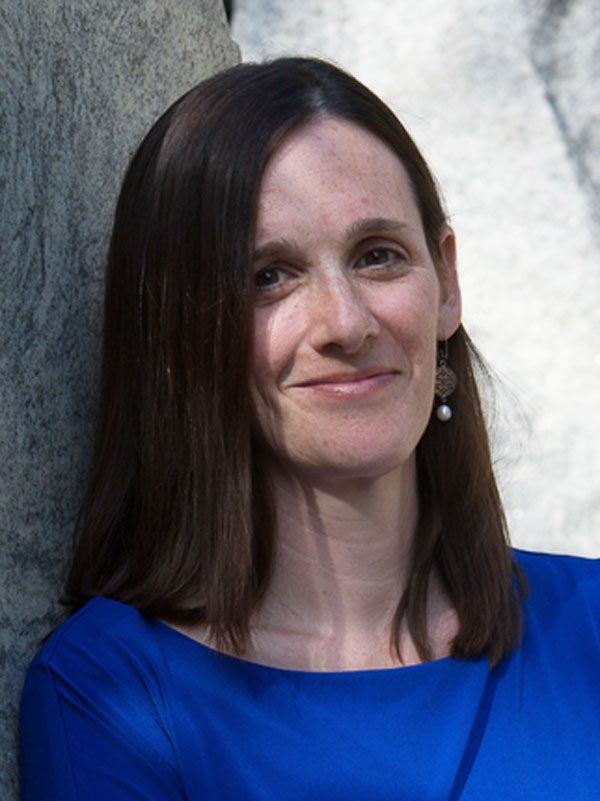
Associate Professor, Rutgers University
Sarah McMahon (she/her/hers) is an Associate Professor at the Rutgers University School of Social Work and Director for the School’s Center for Research on Ending Violence. She also serves as the Special Adviser on Campus Climate to the Executive Vice President for Academic Affairs. Her research focuses on using ecological, social-justice based frameworks to examine the prevention of interpersonal violence, as well as mechanisms for engaging individuals, communities and institutions in social change. Dr. McMahon’s work also explores the ways in which participatory, collaborative processes can enhance the translation of research to practice in community settings. Dr. McMahon has extensive experience in designing and implementing quantitative and qualitative studies related to interpersonal violence, bystander intervention and campus climates. She has led a number of research projects related to campus violence funded at the federal, state, and local level
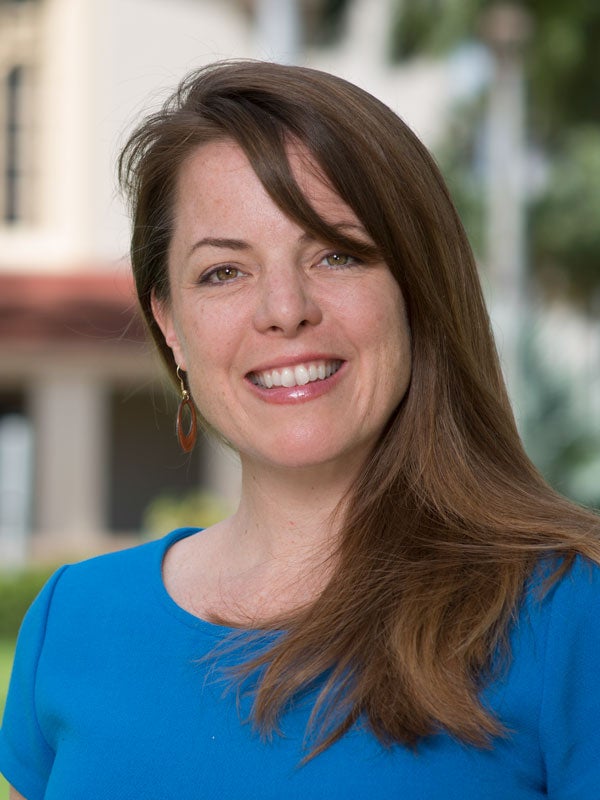
Assistant Professor, Barry University School of Social Work
Sheila M. McMahon, Ph.D., M.Div., MSW, LCSW (she/her/hers) is currently an Assistant Professor of Social Work at Barry University. Her research and practice interests include campus-based and community-level interventions, such as restorative justice (RJ), to prevent and address sexualized violence, build a sense of community, and strengthen well-being. Dr. McMahon’s current research includes co-authoring, with her colleague Dr. Kaaren Williamsen, the first peer-reviewed study in the U.S. of early adopters of RJ for campus sexual misconduct. She is a research team member for the Restorative Justice Research Community (RJRC). This interdisciplinary academic community supports research on restorative justice as an approach to address inequities in the U.S. criminal legal system. Dr. McMahon is also a member of a research team led by Dr. Alissa Ackerman that is piloting restorative justice responses to military sexual trauma (MST). Her work with the Center for RJ at the University of San Diego includes conducting empowerment-based program evaluations with campuses; co-leading RJ trainings; and attending to the need for trauma-responsive, equitable restorative practices. Her experience has led her to become a student of transformative justice (TJ) and she is eager to engage with abolitionist approaches to ending campus sexual and gender-based violence. She holds a Master of Divinity (M.Div.) from Harvard University. She earned her MSW and Ph.D. at the Rutgers University School of Social Work. Dr. McMahon is a licensed clinical social worker in Florida. (She loves to go salsa dancing, drink cortaditos, walk on the beach, and explore ClassPass classes with friends.)
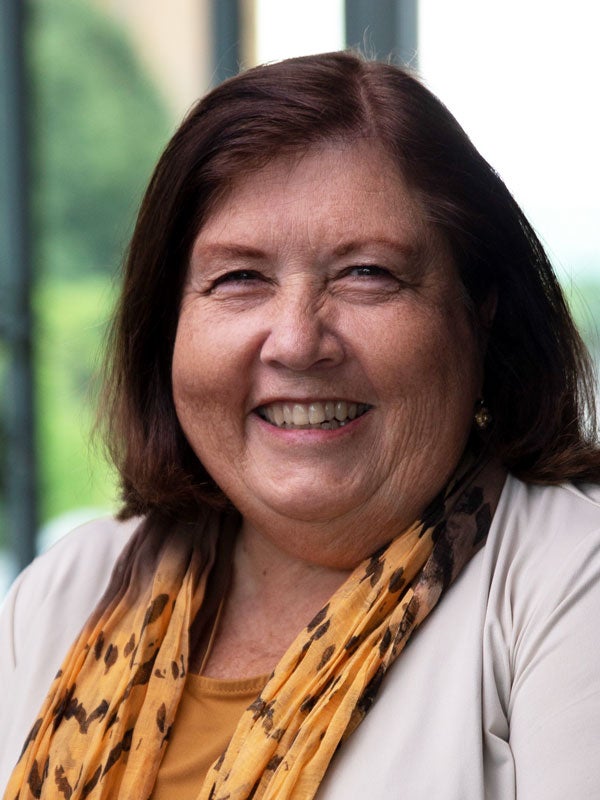
Clinical Assistant Professor and Director Master’s in Nursing Leadership, Analytics and Innovation, University of Michigan
Dr. Medvec’s (she/her/hers) scholarship explores the relationship of nurse manager practice environments and the implementation leadership behaviors of nurse managers in supporting nursing staff use of evidence-based practice. Her experiences include healthcare and system executive and nursing leadership. Dr. Medvec’s interests include leadership, practice innovation, workforce vitality, burnout, value-based care, ambulatory/continuum of care, strategic, digital learning and transformation to practice. She provides support for chief nursing officers in organizational design, transformational leadership and nursing excellence. She values, as a nursing leader and faculty member, the importance of facilitating the transformational changes that should occur with graduate and doctoral level learning. Dr. Medvec believes that it is her role to assist students and colleagues in continuous improvement and ongoing learning.
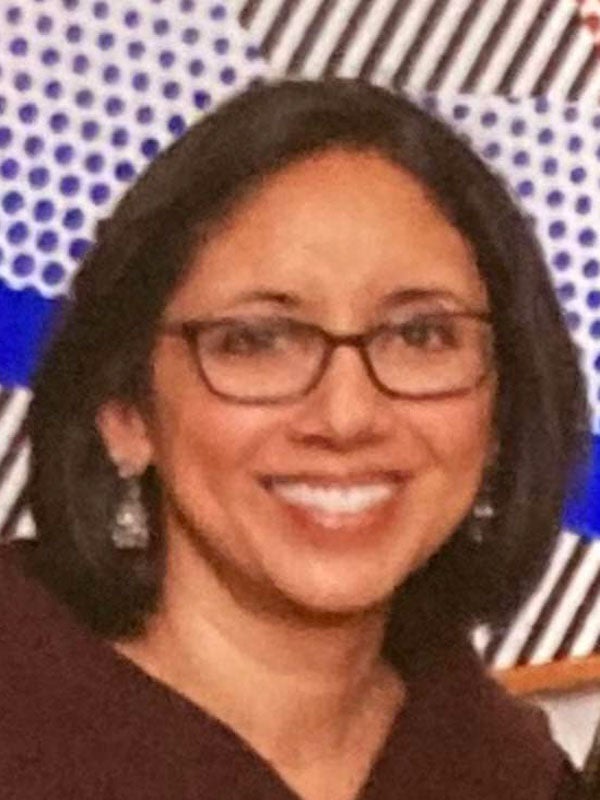
Secretary, University-Wide Committee on Sexual Misconduct, Yale University
Aley Menon, JD, (she/her/hers) is Secretary of the University-Wide Committee on Sexual Misconduct at Yale University. As part of the Provost’s Office, she oversees the formal disciplinary processes and alternative resolution pathways for addressing formal complaints of sexual misconduct involving faculty, students and non-unionized staff. Aley is also helping to lead a campus-wide initiative to bring restorative practices to Yale. Prior to joining the Provost’s Office in 2012, Aley worked in Yale’s Office of the General Counsel on student affairs and employment-related matters, including Title IX. Before her time at Yale, Aley was a University Ombudsperson for ten years and directed a Multicultural Affairs Office for three years. Aley loves to hike, kayak, cook, meditate and spend time with her three children. She is originally from Kerala, India.
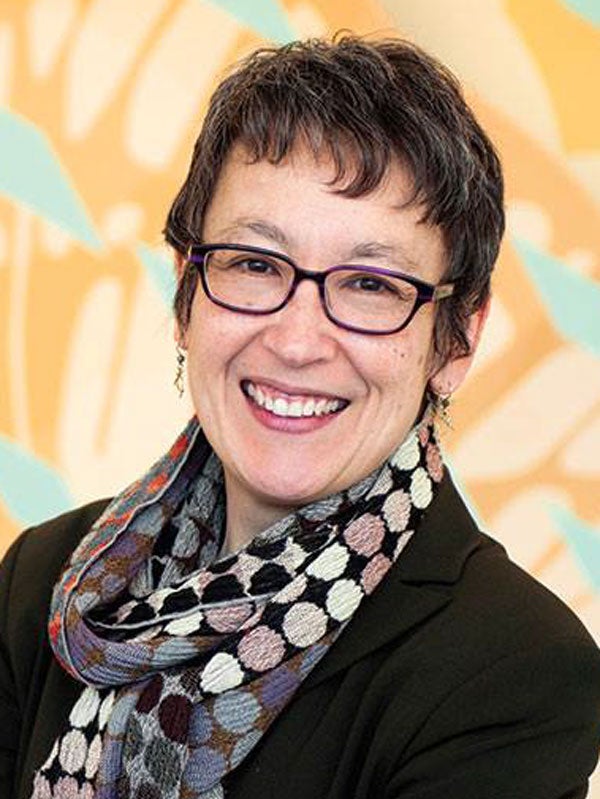
Director, Adolescent and Young Adult Medicine; Professor of Pediatrics, Public Health, and Clinical and Translational Science, University of Pittsburgh School of Medicine
Dr. Elizabeth Miller (she/her/hers) is Distinguished Professor of Pediatrics, Public Health, and Clinical and Translational Science at the University of Pittsburgh School of Medicine, Director of Adolescent and Young Adult Medicine and director of community and population health at UPMC Children’s Hospital Pittsburgh. She holds the Edmund R. McCluskey Endowed Chair in Pediatric Medical Education. Trained in Internal Medicine and Pediatrics and medical anthropology, she has over 20 years of practice and research experience in addressing violence prevention and health equity in clinical and community settings, with funding from the National Institutes of Health, Centers for Disease Control and Prevention, Substance Abuse and Mental Health Services Administration, National Institute of Justice, Office on Women’s Health, and foundations. Her research addresses partner and sexual violence prevention and adolescent health promotion, and she has conducted numerous randomized controlled trials to evaluate innovative clinical and community partnered interventions. She has over 330 peer reviewed research publications, and has authored numerous book chapters, commentaries, and clinical guidelines. She is co-director of a community partnered, collective impact initiative in Allegheny County called The Pittsburgh Study.
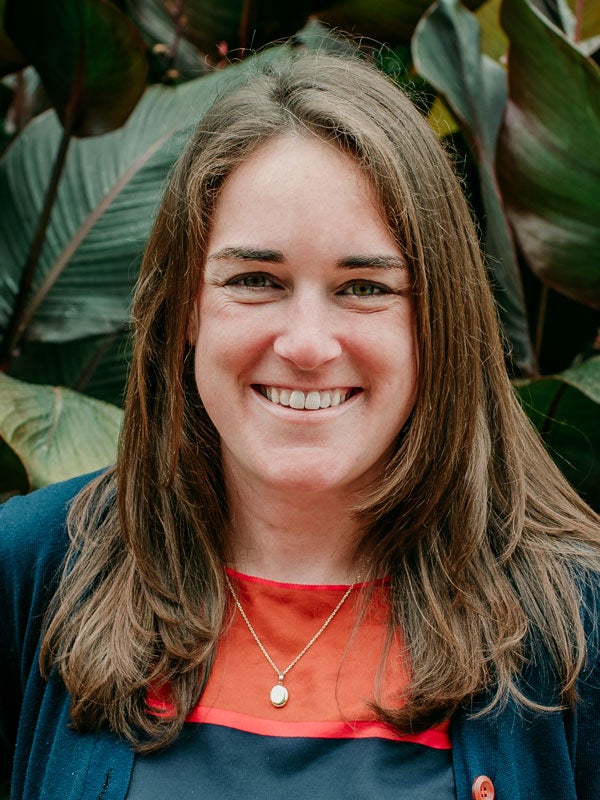
Associate Director, Advocacy Team Supervisor, Michigan State University
Kathleen (she/her/hers) received both her undergraduate and law degree from Michigan State University. She is a licensed attorney in the State of Michigan. Kathleen values multidisciplinary teams that partner together to make survivors’ needs a priority, hold offenders accountable, and increase justice and safety for the community. Kathleen is the former Program Coordinator of the Capital Area Response Effort (CARE), where she advocated for survivors of domestic violence. She previously worked at Lakeshore Legal Aid providing civil legal representation to survivors of domestic and sexual violence.
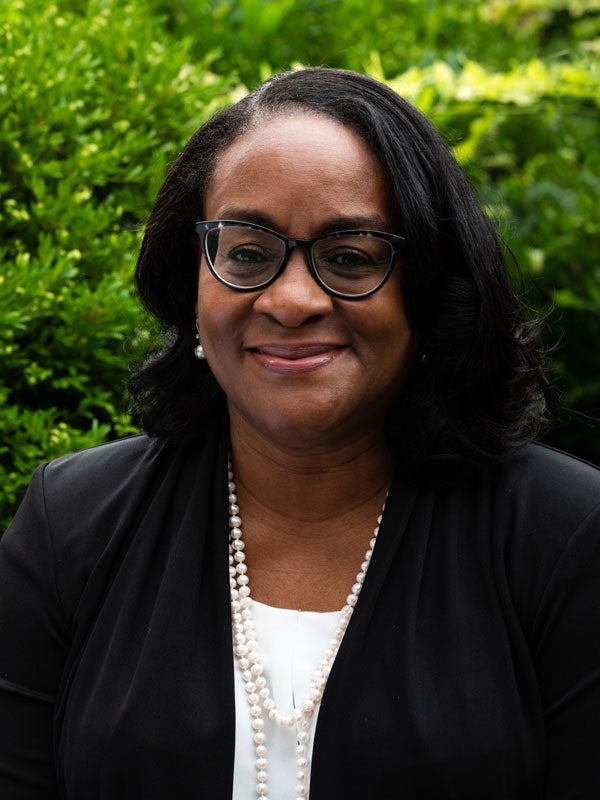
Programs and Services Director, Safe House Center
Kimberli (Kim) Montgomery (she/her/hers) is the Program and Services Director at Safe House Center, Domestic Violence and Sexual Assault Services Organization in Ann Arbor, Michigan. She has 20 + years of experience working with survivors of sexual and intimate partner violence. Kim is motivated by the mission to promote social change in the community and empowerment for survivors.
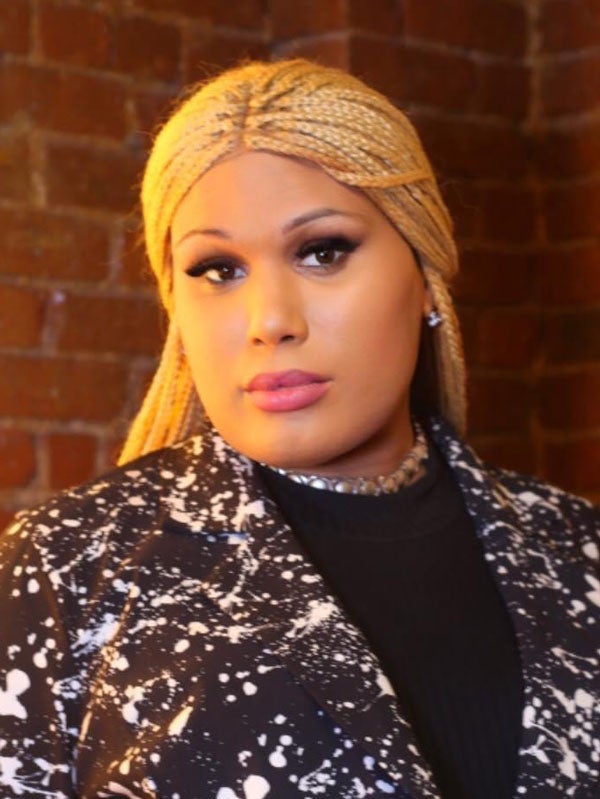
Executive Director, Brooklyn Ghost Project
Ms. Moore (she/her/hers) is a Black Transwoman and the Executive Director of Brooklyn Ghost Project. Ms. Moore is a Certified Peer Recovery Advocate and Credentialed Alcoholism and Substance Abuse Counselor with extensive experience in human services. Her experience includes work as a Recovery Coach for BOOM! Health, a Bronx-based non-profit that delivers a full range of prevention, syringe access, health coordination, behavioral health, housing, legal, advocacy and wellness services to over 8,000 of the hardest to reach communities in NYC, and for Alliance for Positive Change, an NYC-based organization focused on supporting individuals living with HIV. Ms. Moore’s work with Alliance for Positive Change included management of a diverse caseload of individuals living with substance abuse addiction, creating individualized recovery plans facilitating weekly groups, crisis intervention monitoring, mental health referrals, group therapy, peer support, and assessing the efficacy of implemented plans and treatment plans. Ms. Moore served as Program Director for Brooklyn Ghost Project from 2021-2022 before taking on the role of Executive Director after the untimely death of BGP’s founder, Mother LaTravious Collins. In her leadership roles at BGP, she pioneered a community-research partnership with collaborators from Danielle Berke of Hunter College of the City University of New York and Prepare, Inc., an NYC-based violence prevention and personal safety organization, to develop and deliver a tailored Empowerment Self-Defense violence prevention program to Brooklyn Ghost Project constituents. Ms. Moore also received comprehensive training in the peer-facilitation of this evidence-based self-defense training. As ED, Ms. Moore oversees the implementation of the trauma-informed, evidence-based community violence prevention programming offered at the Brooklyn Ghost Project and coordinates grant-writing and fundraising activities.
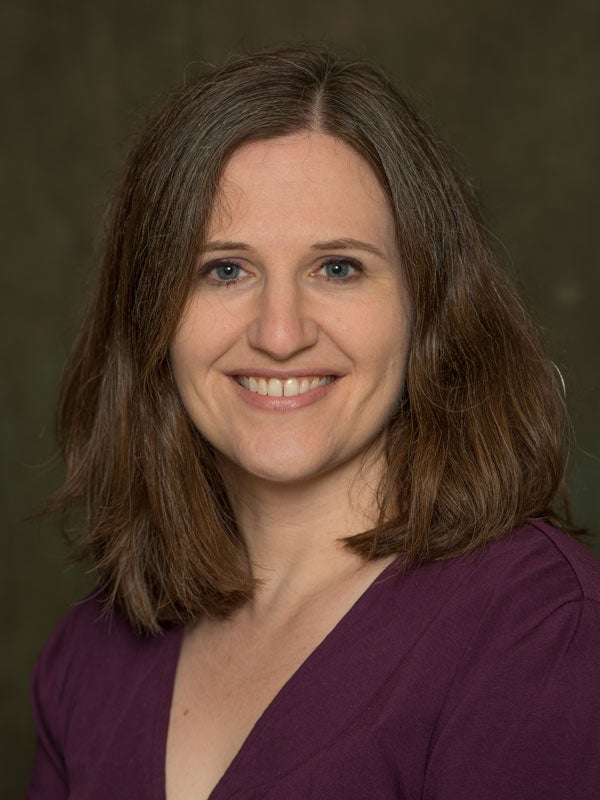
Associate Professor, Michigan State University
Carrie Moylan (she/her/hers) is an Associate Professor in the Michigan State University School of Social Work and a member of the MSU Research Consortium on Gender-Based Violence. She has more than 20 years of experience in the gender-based violence field, both as a practitioner and as a researcher. Dr. Moylan’s program of research focuses on the promotion of effective, evidence-based and trauma-informed interventions, policies, and services aimed at preventing sexual violence and responding to the needs of survivors. Currently, she is engaged in research examining sexual assault policy implementation at colleges and universities, as well as research using multi-campus datasets to identify campus-level risk and protective factors. She is also interested in the role of campus culture and climate in shaping campus sexual assault prevalence and response. She has brought that expertise into her role leading the Know More @ MSU climate surveys in 2019 and 2022, as well as consulting on survey design for the State University of New York system, American Association of Universities, and others.
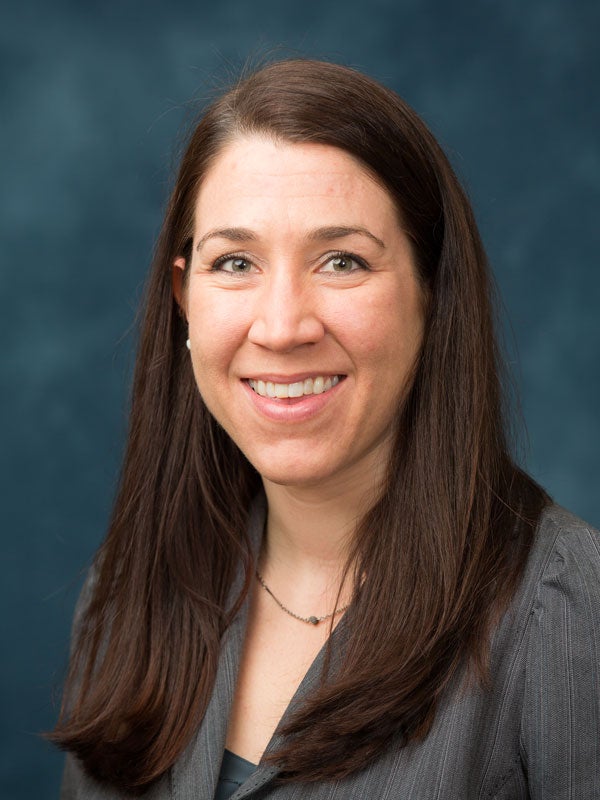
Assistant Professor, Suzanne Bellinger Feetham Professor of Nursing, & Director of Global Programs, University of Michigan
Dr. Michelle Munro-Kramer (she/her/hers) is a nursing scientist, certified nurse midwife, and family nurse practitioner. Her program of research focuses on gender-based violence prevention and response, primarily among college-age youth, within domestic and international contexts. As part of the inaugural Johnson & Johnson Nurse Innovation Fellowship, she is interested in leveraging nurses’ creativity to develop innovative solutions to complex health and human rights issues such as intimate partner violence, sexual violence, and human trafficking. Her research projects approach these topics using a trauma-informed and patient-centered lens. She uses mixed methods and participatory action research to understand the experiences of vulnerable populations in order to inform innovative future intervention development.

Ph.D. Candidate in Psychology and Women’s and Gender Studies, University of Michigan
Leanna Papp (she/they) is a Ph.D. candidate in the Departments of Psychology and Women’s and Gender Studies at the University of Michigan. Her research focuses on the normalization of sexual violence against women. Leanna developed the concept of “sexualized aggression” to focus attention toward understudied forms of sexual violence; during graduate school, they designed and implemented a mixed methods, longitudinal study of sexualized aggression in undergraduate women’s social lives. Leanna’s research illustrates how everyday violence limits young women’s freedom and shapes how they see the world, ultimately refuting cultural messages that such experiences are “no big deal.” Beginning in Fall 2023, Leanna will be an Assistant Professor of Population Health Sciences and core member of the Violence Against Women Faculty Cluster Initiative at the University of Central Florida.
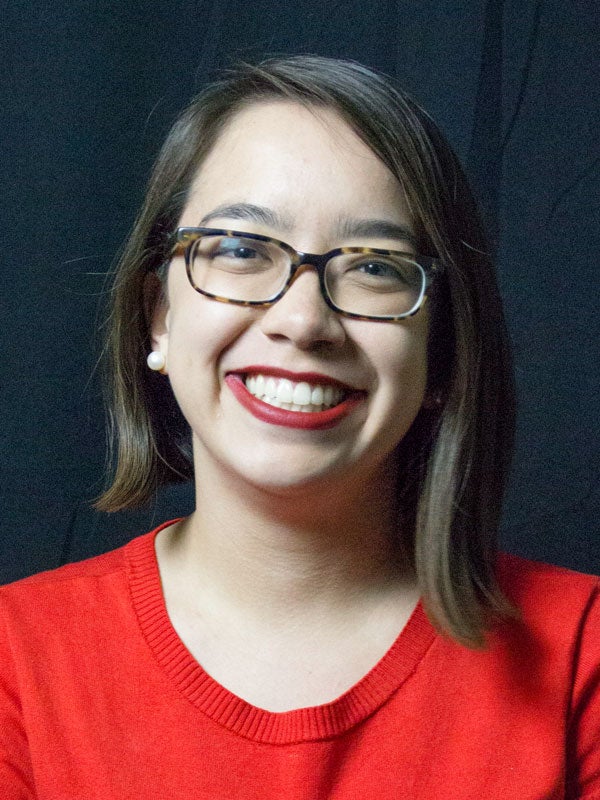
Assistant Professor, University of Michigan
Sarah Peitzmeier, PhD (she/her/hers) is an Assistant Professor at the University of Michigan School of Nursing and School of Public Health. Her mixed-methods research focuses on the epidemiology and prevention of gender-based violence, as well as LGBTQ+ health and HIV. She has received funding from the NIH, the CDC, and the Canadian Institutes of Health Research, and is best known for her research to understand, screen for, and intervene on intimate partner violence in transgender populations, as well as her work around the health impacts of chest binding in transmasculine individuals. Her ongoing work includes intervention development studies to prevent campus sexual assault against transgender undergraduates and cisgender women undergraduates. She received her PhD from the Johns Hopkins Bloomberg School of Public Health in 2017.
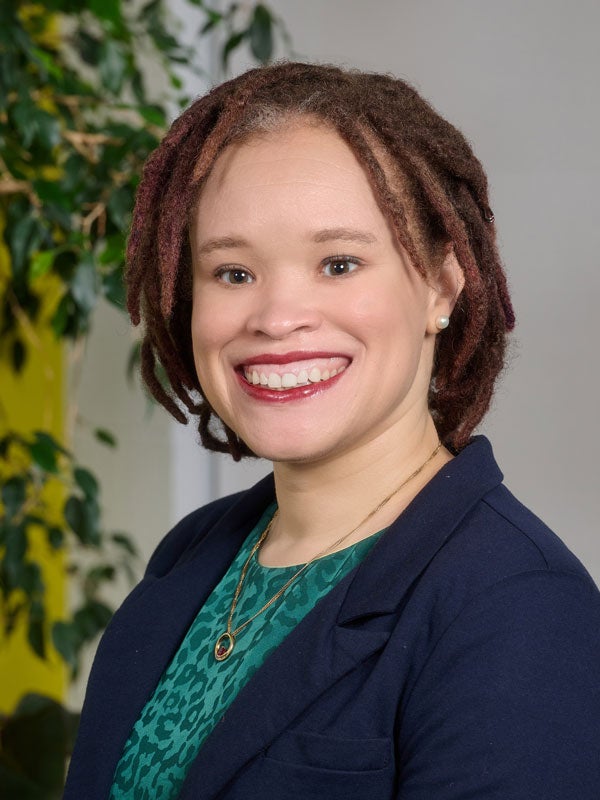
Assistant Professor, The Pennsylvania State University
Kamaria B. Porter, PhD. (she/her/hers) is an Assistant Professor of Education Policy Studies at The Pennsylvania State University. Dr. Porter’s research examines gender and racial inequities in higher education, particularly university response to sexual assault, graduate education, and faculty experiences. Her dissertation, Speaking into Silence: Intersections of Identity, Legality, and Black Women’s Decision to Report Sexual Assault on Campus examined Black women’s perspectives of the legal system in weighing whether to formally report sexual violence. Using her background as a counselor to survivors, Porter adapted her research design to include trauma informed practice. This study aims to understand how race, gender, and class influence Black women’s decision making around reporting sexual harm and propose protective measures to prevent sexual violence and support student recovery after sexual assault exposure. Prior to graduate school, Dr. Porter worked as a community organizer in Chicago, focusing on expanding health care access and affordable housing. While earning her Masters in Higher Education at Loyola University Chicago, she trained to be a rape survivor crisis counselor, assisting survivors and their families in ERs as they navigated complex medical and legal decisions.
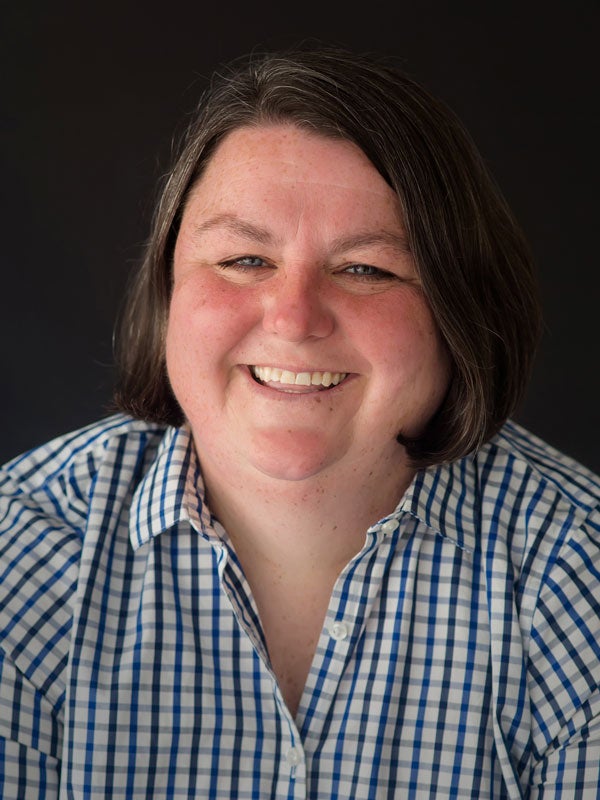
Associate Director/Therapy Team Supervisor, Michigan State University Center for Survivors
Erin (she/her/hers) has a B.A. in Psychology and a Masters in Social Work from Michigan State University. Most recently she managed a leading-edge Non Profit Management program through the Michigan Coalition to End Domestic and Sexual Violence (MCEDSV) to support domestic and sexual assault programs across the state in strengthening leadership and sustainability, providing guidance on non-profit management, and delivering trainings on best practices in service delivery. Prior to her role with MCEDSV, Erin was the Executive Director of End Violent Encounters (EVE) in Lansing, Relief After Violent Encounters – Ionia/Montcalm, and the Foundation Director for the American Academy of Cosmetic Dentistry. Erin has been active in community engagement and healing projects for much of her career. She has served on committees and/or as a mentor in the DV/SA movement with groups invested in helping the homeless, the LGBTQ community, and advocating for children and families. She lives in East Lansing with her wife, 2 children, and pets.
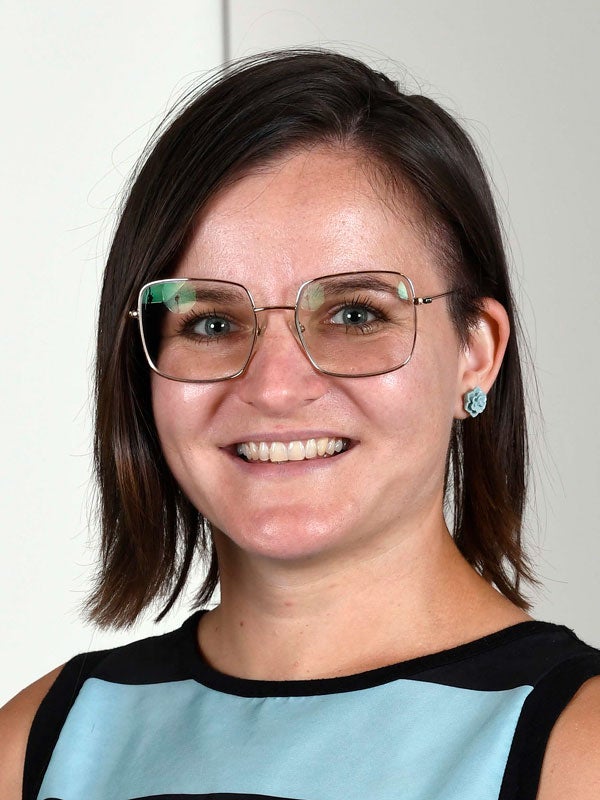
Doctoral Student, University of Michigan
Yuliya (she/her/hers) is a third-year student in the University of Michigan Joint Doctoral Program in Social Work and Social Science (Clinical Psychology) working with Drs. Lisa Fedina and Lilia Cortina. Yuliya studies interpersonal violence (domestic violence, police violence, college campus violence) as well as war and military recruitment.
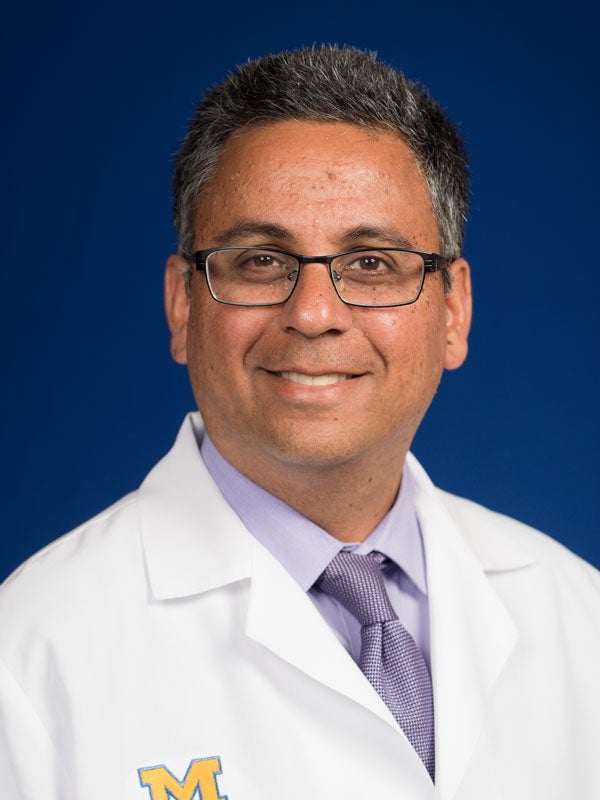
Clinical Associate Professor, University of Michigan
Vijay Singh, MD MPH MS FAAFP (he/him/his) is a family medicine physician, hospitalist, and Clinical Associate Professor in the Departments of Internal Medicine, Emergency Medicine, and Family Medicine at the University of Michigan (U-M) Medical School. He received an MD from Northwestern University, MPH from Johns Hopkins University, and MS from U-M. He completed his family medicine residency at UCLA, and RWJF Clinical Scholars Program at U-M. He works clinically at U-M and has over 20 publications focusing on healthcare identification and response to intimate partner violence and adolescent dating abuse, including for people who harm. His research has been funded by the World Health Organization, American Academy of Family Physicians Foundation, and Society of Teachers of Family Medicine Foundation. He is a fellow of the American Academy of Family Physicians, Core Faculty in U-M Injury Prevention Center, Faculty Associate at U-M Global Reach, Faculty Affiliate at U-M Institute for Research on Women and Gender, and member of U-M Institute for Healthcare Policy and Innovation.
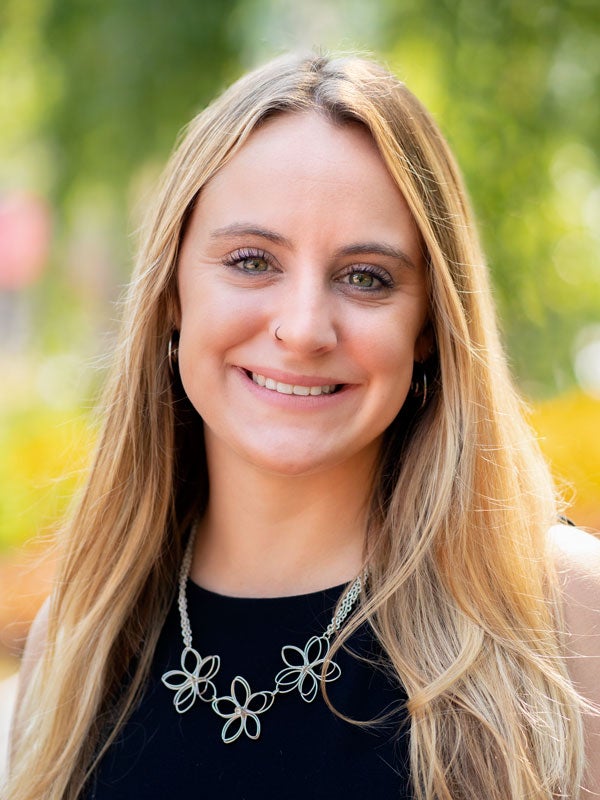
Assistant Professor, Temple University
Laura Sinko, PhD, MSHP, RN (she/her/hers) is an assistant professor in the Department of Nursing at Temple University College of Public Health. She is a former child and adolescent mental health nurse and is currently a practicing sexual assault nurse examiner in Philadelphia. She is also the Director of Research and Evaluation at Our Wave, an online education and community building platform for survivors of sexual harm. Dr. Sinko’s research focuses on promoting healing after gender-based violence, with a particular emphasis on social, cultural and structural influences of recovery across the lifespan. Her work has been conducted domestically in both the campus and community setting as well as internationally through a multinational gender-based violence research collaborative called MiStory. Dr. Sinko is also interested in the role of restorative justice as it relates to sexual harm as well as LGBTQ+ considerations in the survivor care space. Dr. Sinko emphasizes creative research translation as well as research that is trauma-informed and healing-centered. She has expertise in both narrative and photography-based qualitative methods and has organized multiple community exhibitions to share her research findings as well as the healing journeys of the survivors she has interviewed. Ultimately, Dr. Sinko is interested in leveraging creative, survivor-centered research to bridge the gap between survivor lived experience, the scientific community, and policy makers. By amplifying these perspectives, Dr. Sinko’s goal is to create a more supportive healing world for survivors of violence and abuse.
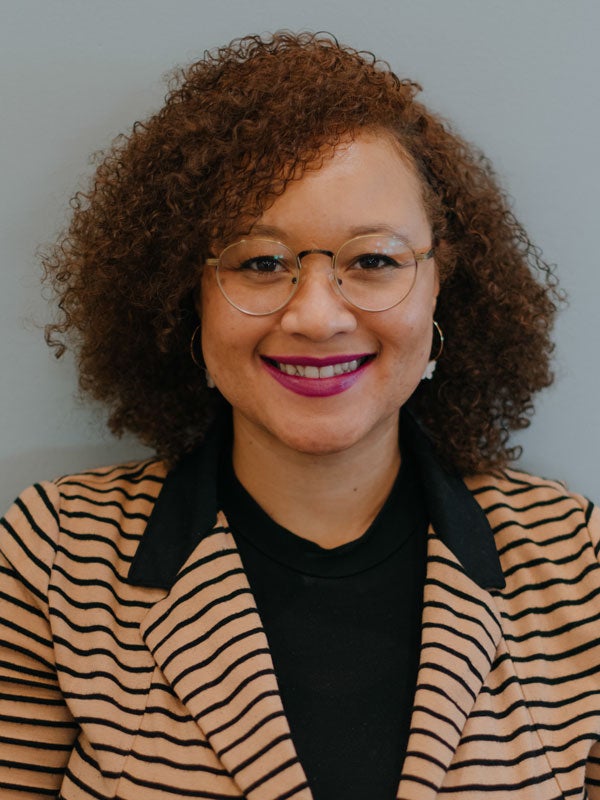
Case Manager/Advocate, University of Michigan
Tangela (she/her/hers) received her Master’s Degree/ Professional Counseling from Central Michigan University. Tangela has over 10 years of experience advocating for and providing support to survivors of sexual violence on their healing journey. Prior to joining the SAPAC team, Tangela worked as a therapist at a non-profit and domestic violence shelter. While working there she provided individual and group therapy for survivors of Sexual Assault and/or Intimate Partner Violence. In addition to working with survivors, Tangela believes community engagement and collaboration is crucial to ending gender-based violence. She has experience developing and facilitating workshops and educational programs related to mental health and gender-based violence. Tangela is passionate about racial Justice is committed to DEI efforts and best practices for providing care to individuals who continue to experience marginalization due to their racial, gender, sexual and/or socioeconomic identities. Tangela brings a versatile skill set and an abundance of knowledge that includes crisis-intervention, advocacy, prevention education, trauma-informed care, validation, and empowerment through the healing process.
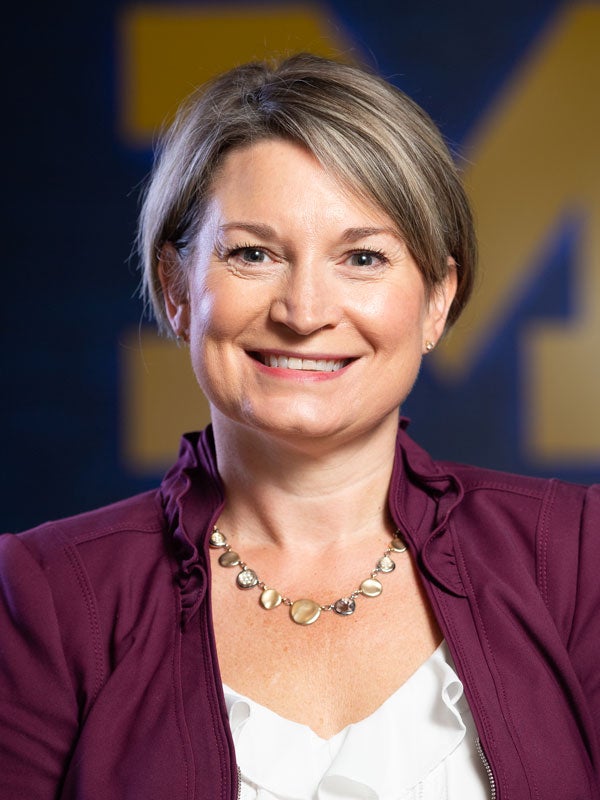
Performance Consultant, University of Michigan
Krista Stelmaszek (she/her/hers) is a performance consultant specializing in organizational development. She consults with units and designs organizational culture and change management programming. Krista served as project manager for the Working Group on Faculty and Staff Sexual Misconduct. She worked to operationalize the recommendations from this group, resulting in the first university-wide required training program, “Cultivating a Culture of Respect.” In collaboration with Dr. Reshma Jagsi, Krista designed a curriculum addressing gender bias. She also wrote the online module, “Building a Culture That Thrives: Preventing Retaliation.” Krista received her bachelor’s in psychology from the University of Michigan and her master of science in human resources and organizational development from Eastern Michigan University.
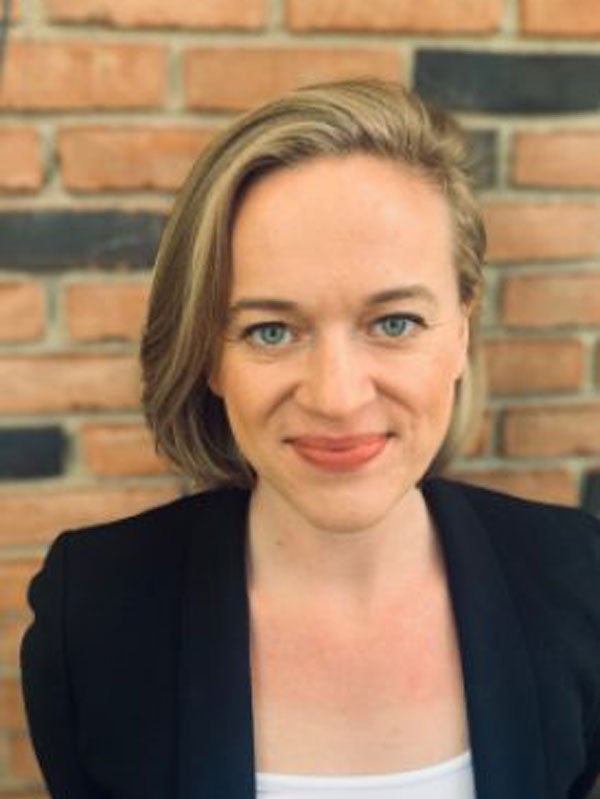
Assistant Professor of Sociology, University of Michigan
Paige Sweet (she/her/hers) studies gender and sexuality, knowledge, gender-based violence, health and illness, the state, and embodiment. She is interested in gendered and sexual forms of governance: how people’s identities and practices are shaped by state programs and medicalized categories. Her research is rooted in careful attention to survivors’ intersectional experiences and voices. Paige’s book, The Politics of Surviving: How Women Navigate Domestic Violence and its Aftermath, was published with University of California Press in 2021.
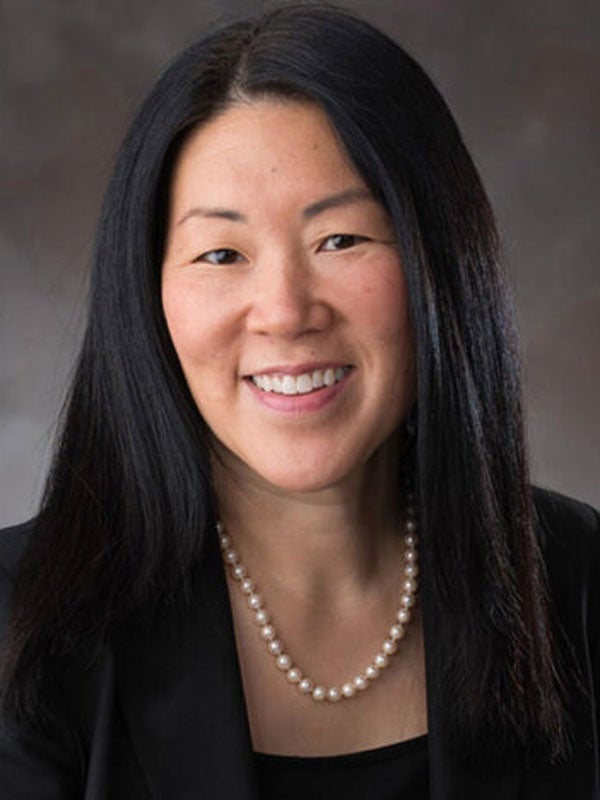
Executive Director and Special Advisor to President, University of Michigan
Tami Strickman (she/her/hers) serves as special advisor to the president and executive director of the Equity, Civil Rights, and Title IX Office. In this role, she is a key leader in helping to institute cultural change and shape new policies, educational programs, and organizational structures to better prevent and respond to sexual misconduct and other forms of discrimination. She currently co-leads the Coordinated Community Response Team (CCRT.) Prior to joining the University of Michigan, Tami was Associate to the Chancellor for Institutional Equity and Compliance and Title IX Coordinator at the University of Nebraska-Lincoln. She was responsible for all matters involving allegations of discrimination under Title VI and VII of the Civil Rights Act of 1964, the American with Disabilities Act and Title IX of the Education Amendments Act of 1972.
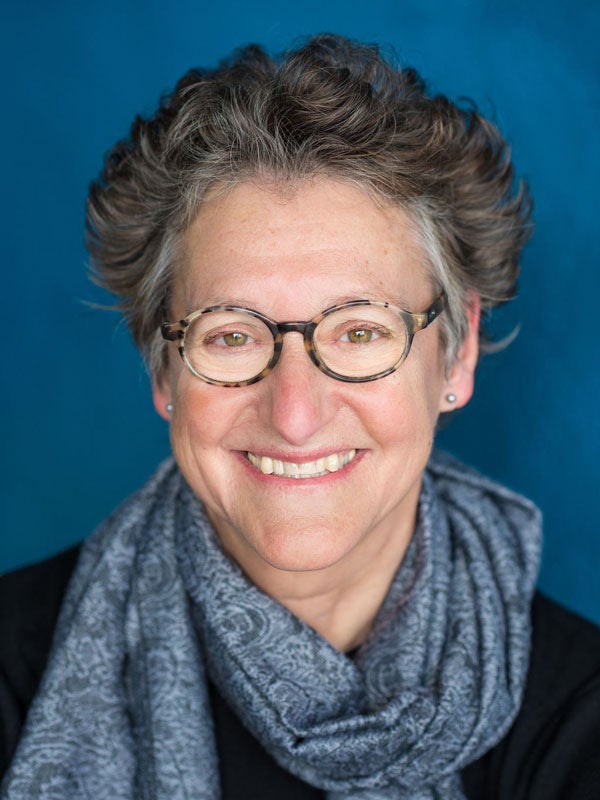
Senior Consultant, Klancy Street
Joan Tabachnick (she/her/hers) brings over 30 years of experience developing educational materials and innovative sexual violence prevention programs for national, state and local organizations. She serves on a number of national and statewide task forces including the National Center for Missing and Exploited Children and Stop It Now!. Her written work includes a National Sexual Violence Resource Center publication titled “Engaging Bystanders in Sexual Violence Prevention,” and another titled “Family Reunification after Child Sexual Abuse,” and a publication through ATSA called “A Reasoned Approach: The Reshaping of Sex Offender Policy to Prevent Child Sexual Abuse” as well as numerous articles and book chapters. Her primary focus is on preventing the perpetration of sexually harmful behaviors, particularly in adolescents and young adults. Joan is a fellow of ATSA (Association for the Treatment and Prevention of Sexual Abuse), of PIRC (Prevention Innovations Research Center) and just completed a fellowship with the US Department of Justice, SMART Office with a focus on preventing the perpetration of campus sexual misconduct. Joan now co-leads the STARRSA training initiative at Klancy Street and maintains an active consulting practice, as well as her commitment to opening the door for healing and prevention for those at risk to cause harm.
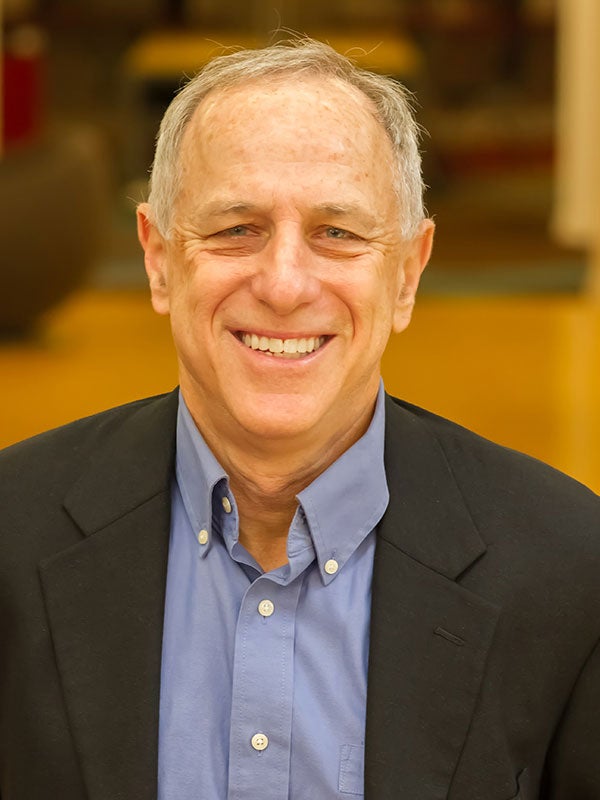
Professor, University of Michigan
Richard M. Tolman (he/him/his) is the Sheldon D. Rose Collegiate Professor of Social Work at the University of Michigan and an American Academy of Social Work and Social Welfare Fellow. Rich’s work focuses on prevention and intervention to end gender-based violence (GBV). He began this work as a practitioner in a battering intervention program in Anchorage Alaska in 1980. was an author of one of the earliest books on battering intervention. His other contributions to the gender-based violence literature include the development of a widely used measure of psychological maltreatment of women, demonstrating the accuracy of survivors’ predictions of future abuse, research on how intimate partner violence impacts low-income women’s economic, physical and psychological well-being, and adolescent intimate partner violence. Dr. Tolman founded and co-led a research team that conducted a series of studies on men’s involvement in prevention of GBV. His current projects include research on survivors’ perspectives on the effectiveness of battering intervention, the impact of domestic violence during the COVID-19 pandemic, campus sexual assault prevention, the prevention of abuse during pregnancy, and relatedly, on understanding men’s transition to fatherhood.
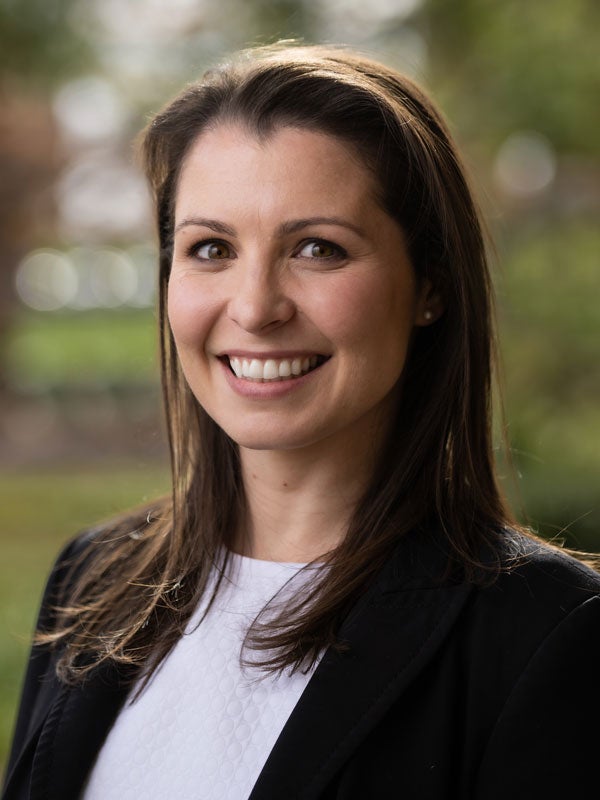
Assistant Director of the Prevention Education, Assistance & Resources, University of Michigan
Sophie (she/her/hers) serves as the Assistant Director at the Prevention Education, Assistance & Resources (PEAR) unit within the Equity, Civil Rights, and Title IX Office at the University of Michigan. Born and raised in France, she went to law school in Paris and moved to New York City for her Master of Arts degree in Criminal Justice and Counterterrorism at John Jay College of Criminal Justice. Previously, Sophie worked at the Prevention, Outreach and Education Department (POE) at Michigan State University and at the Crime Victims Assistance Unit (CVAU) at the Bronx District Attorney’s Office where she gained her expertise in sexual and gender-based misconduct. She is passionate about developing and facilitating prevention programming for faculty and staff on the Title IX regulations, university misconduct policies, and supporting resources in order to build an inclusive, trauma-informed, and violence-free environment for all.
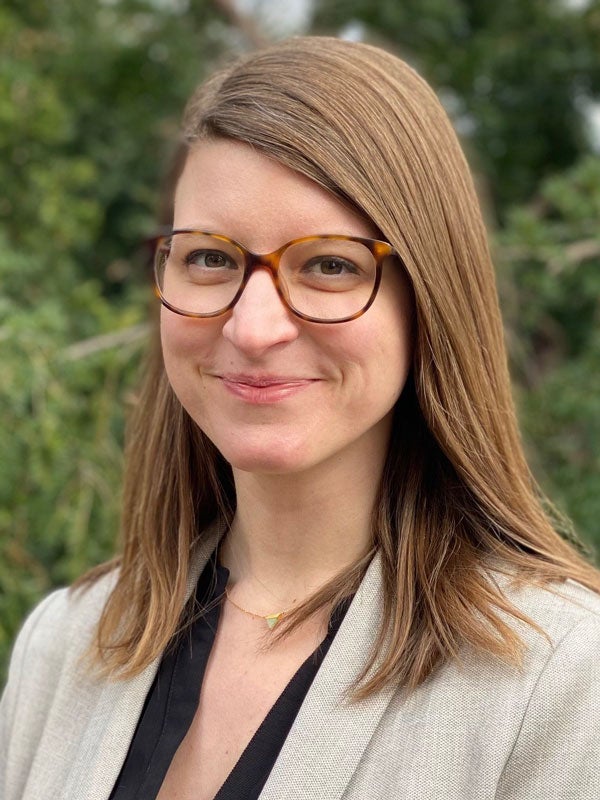
Assistant Director, Climate & Response Unit in Prevention, Outreach and Education, Michigan State University
Lydia (she/her/hers) works on creating a university network of programs, outreach and support for all Michigan State University employees and students. She coordinates training, supports and evaluations in response to relationship violence and sexual misconduct climate concerns or requests.
Lydia earned a bachelor’s degree in sociology from MSU and a master’s degree in women, gender and sexuality studies from the University of Cincinnati. She has worked at MSU since 2013. Prior to joining the POE team, she worked in the Women’s Resource Center and the WorkLife Office, where her passion for educational programming blossomed. Lydia is dedicated to creating equal access to resources, services and educational opportunities for all, with a particular focus on gender justice issues. Lydia volunteers as the co-chair for the empowHER Leadership Retreat for 450 4th-9th grade girls, held in April every year. In her spare time, you can find Lydia going on walks with her sweetheart and their dog and three cats (yes, the cats come on walks), or finding and enjoying the best vegetarian cuisine across Michigan.
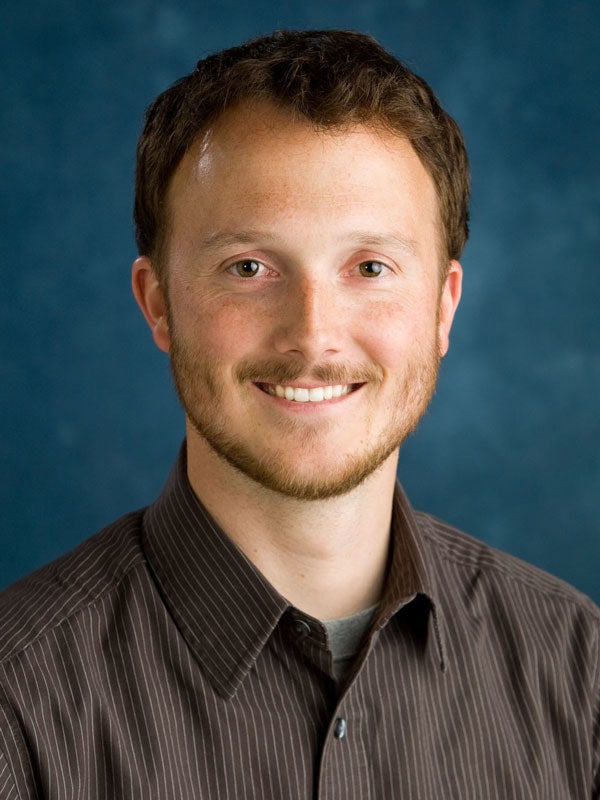
Principal, Klancy Street, LLC
Jay K. Wilgus, J.D., M.D.R., (he/him/his) is a lawyer, mediator, educator, consultant, and facilitator specializing in multi-party dispute resolution processes and dispute resolution systems design. Prior to forming Klancy Street, he served as Director of the Office of Student Conflict Resolution at the University of Michigan, Assistant Dean of Students at the University of Utah, and an attorney-mediator in private practice. Wilgus is a national leader in the field of student conduct and conflict management who is regularly called upon to assist postsecondary institutions, federal agencies, academics, and others seeking to improve institutional responses to student conduct, student conflict, and sexual misconduct. His published work has addressed, among other things, the application of restorative justice practices to student sexual misconduct cases, the use of specialized risk assessment and treatment interventions for college students found responsible for sexual misconduct, and the utility of facilitated dialogue in addressing campus conflict. Wilgus now oversees Klancy Street’s menu of law, consulting, and dispute resolution services and provides direct service to clients across the country. He holds an Honors degree in Communications from the University of Utah, a Master’s in Dispute Resolution (M.D.R.) from the Straus Institute for Dispute Resolution at Pepperdine University, and a J.D. from the S.J. Quinney College of Law in Salt Lake City where he served as a member of the Utah Law Review. He currently serves as President for the Maine Association of Mediators, Co-Chair of the Braver Angels Alliance of New England, and Group Leader for a community of practice affiliated with the Center for Restorative Justice at the University of San Diego. He is licensed to practice law in the State of Utah.
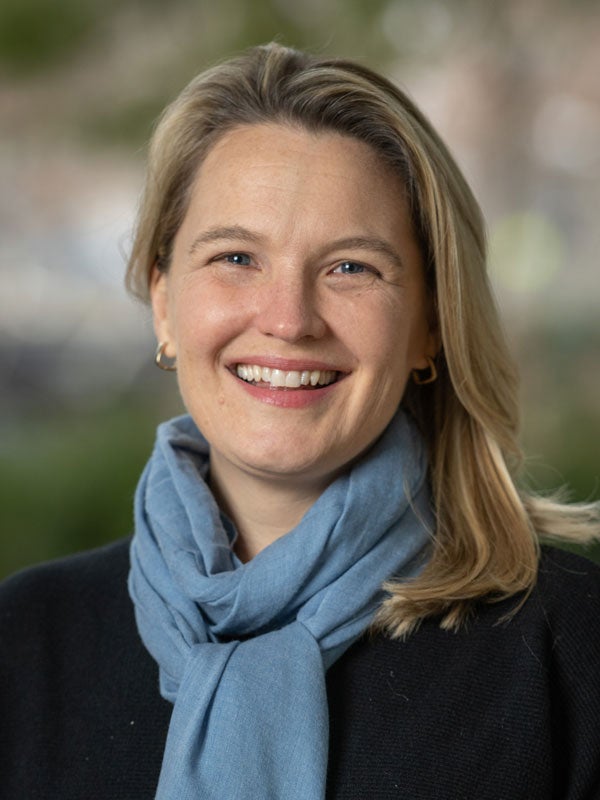
Director of the Prevention Education, Assistance & Resources, University of Michigan
Kaaren M. Williamsen, Ph.D., (she/her/hers) is the Director of the Prevention Education, Assistance & Resources (PEAR) unit within the Equity, Civil Rights, and Title IX Office at the University of Michigan. Previously, she served as the Director of U-M’s Sexual Assault Prevention and Awareness Center from 2017-2022. She came to U-M from Swarthmore College in Pennsylvania where she was the Title IX coordinator. Earlier in her career she spent 15 years directing the Gender and Sexuality Center at Carleton College. As the founding director, she developed innovative sexual violence prevention programming and created institutional support services for LGBTQ students. Kaaren earned her doctorate in organizational leadership, policy and development at the University of Minnesota. She has a Master of Science degree in women’s studies and a Master of Arts degree in counseling and student personnel psychology.
